#especially in the context of the rest of the book it was devastating
Text

In the Pines, Alice Notley
#quotes#quote#poetry#poem#alice notley#id in alt text#this absolutely took me out for some reason#especially in the context of the rest of the book it was devastating
905 notes
·
View notes
Text
I really loved the conversation Egwene and Moiraine have in Book 5 when Egwene tells Moiraine about Siuan being deposed as Amyrlin and stilled. I really resonated with the part where Egwene asks Moiraine how she can be so outwardly cool learning about what happened to Siuan given their long “friendship” and Moiraine basically says that she and Siuan made their choices years ago and they always knew payment would come due one day. I think it helps me contextualize where they both would be mentally in and after 02x07. I’m still devastated for them, but it helps to remember that their headspace is such that they are not only prepared to lose everything they have been working for at literally any time, but honestly *expect* it.
I also had obviously reacted similarly to Lan and Nynaeve to Moiraine swearing to obey Rand because I bristle at any narrative where strong women have to bow to reactive boys, but Moiraine’s perspective in this conversation helps get across just how much it’s not about Rand’s authority but about her knowing the best way to get him to listen to her and being willing to do whatever that takes given the stakes. (And he absolutely has to listen to her about balefire so like, any sacrifice that gets him to do that is a noble one in that context.)
I also loved this conversation because Egwene leaves it feeling like she just talked to Moiraine as an equal. Given that Egwene is one of few characters so far we’ve really watched grow and have an emotional journey (for many of them their character changes are thrust on us through plot, at least so far), her getting to have that dynamic with Moiraine feels really deserved. And it helps me understand how Egwene gets to the point where she could be Amyrlin, and I’m excited about it for her.
I’ve really appreciated Egwene for a while, but especially since we got to the Waste, and I’m excited to go along with her on the rest of her journey. I still think if I had read these books when I was younger and before the show Moiraine would still have been my favorite (I always like the Merlin/Gandalf/Dumbledore character the best), but I’m starting to see how much I think I’d have also resonated with Egwene on the more personal level, and that’s really fun.
#wheel of time#wot book spoilers#moiraine damodred#egwene al'vere#proof that as much as I’ve been voicing frustration with these books I’m also still enjoying them!#the things that annoy me are still outweighed at this point by the things I’m enjoying and my desire to know how plot points are resolved#dril reads wot
61 notes
·
View notes
Text
Submariner Summer 23
Hey hey everyone its time for #SubmarinerSummer read through, part 23. Diving into Tales to Astonish #90: To Be Beaten By BYRRAH! The cover paints quite the tableau, too. Byrrah, a Golden Age rival of Namor, now makes his Silver Age debut to bedevil our sea prince once more.
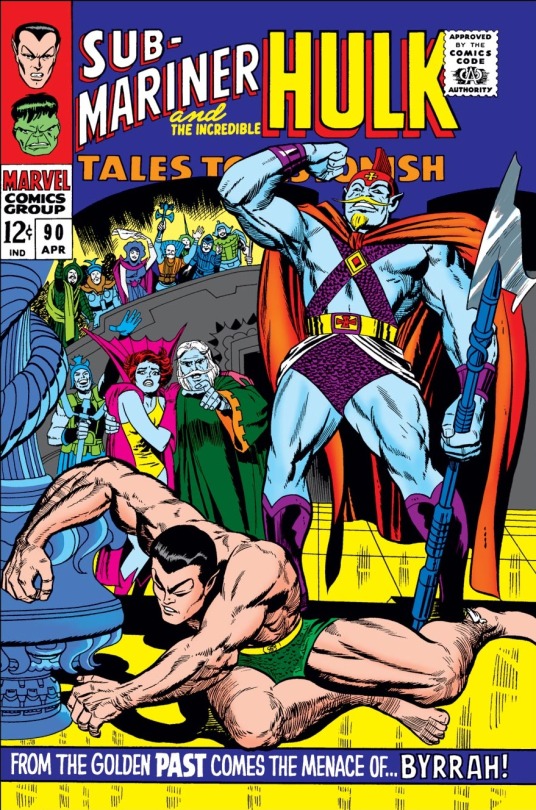
On the Title page, we are quickly reintroduced to him just as his long-laid plans to destroy Namor are ready to begin. The fiend! Truly an appropriate antagonist for issues with art by Bill Everett, and I'm sure that's no coincidence. Also dig those Forbush water ballets! 🤭
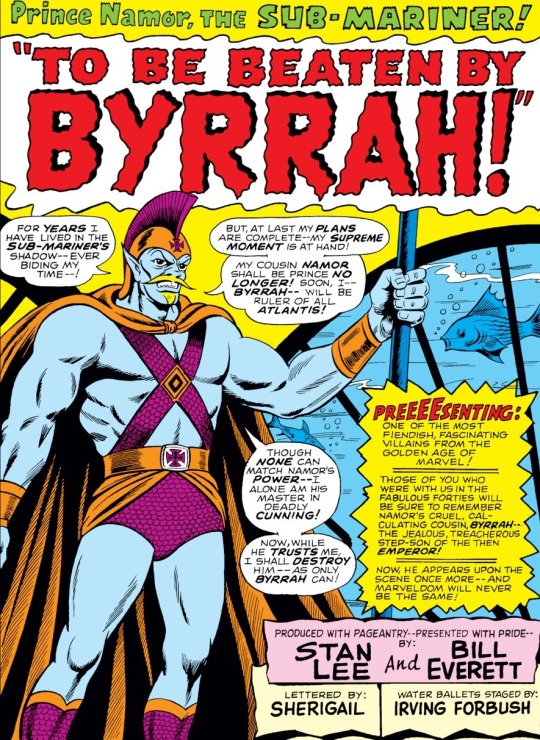
Fair warning, I'm likely to get a little ranty since this ish leans on a key element of Namor lore that deserves highlighting. Case in point: racism. Namor has faced it his whole life from other Atlanteans, including and perhaps especially from other royal Atlanteans
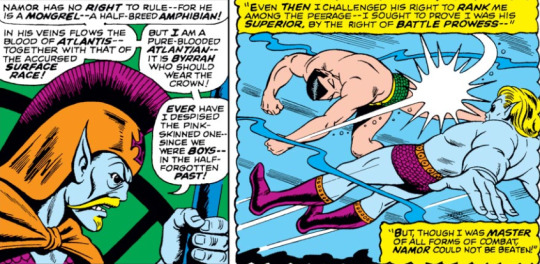
Being mixed-race has been a challenge he's had to struggle with; his arrogance, insisting on his own worth and excellence, is a *response* to that struggle. He'll show them who's a "mongrel" "half-breed"; and of course, his physical power has been his avenue to that validation.
Of course its no easier for him on the surface; he doesn't even pass for *human*, let alone white (he's typically described as looking asian, traditionally, if he's described in human terms). He is absolutely always an outsider there. So why is Namor so angry all the time?
Lol. Rofl. LMAO, even. Why *wouldn't* he be?
ANYWAY, back to Byrrah, blond racist of Atlantis. He's been biding his time, using his aristocratic influence building up trust and influence with people and connections that will help him take control for his own selfish gain
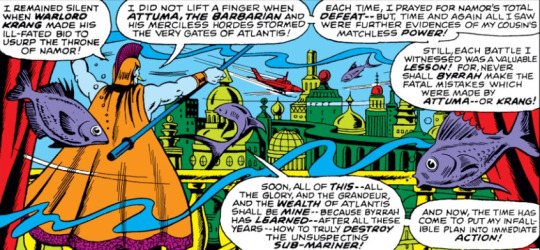
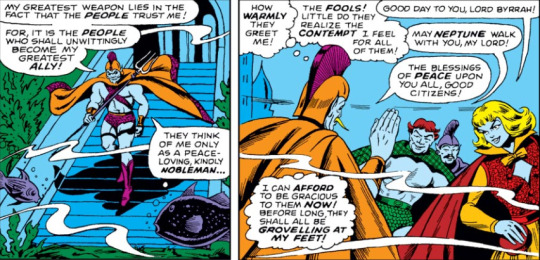
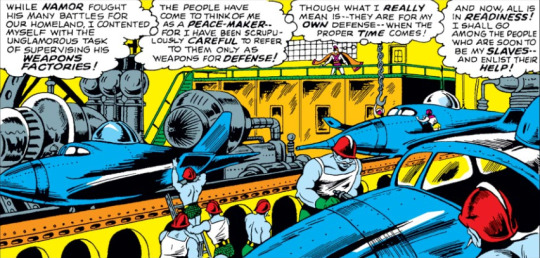

Now he sees his chance, and starts a full public relations campaign, painting himself as peace-loving and Namor as a warmonger, as well as a "freak" who's just dumb and strong because again, metaphorical racism. And it seems to work well as people start to call for a plebiscite

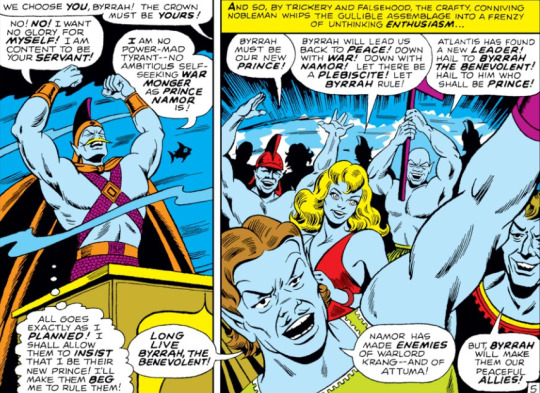
Of course, he's pulling this little Game of Thrones move while Namor is away. Luckily, Lord Vashti comes to let him know. Namor doesn't believe it could work, but Vashti disavows him of that, so Namor returns to Atlantis to try and counter Byrrah.
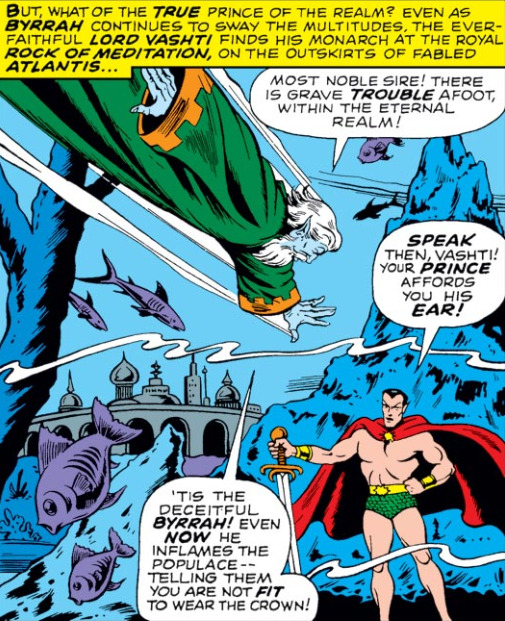

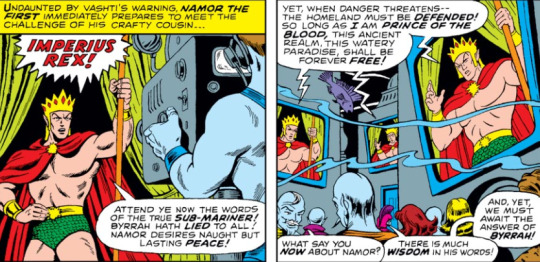
Byrrah had planned for just that, and takes the opportunity to demand a royal challenge for Namor calling him a coward. This seems counterintuitive, since Namor is more powerful, so Dorma is suspicious, as is Vashti, but Namor is Namor, and Byrrah knows him well...so its on!

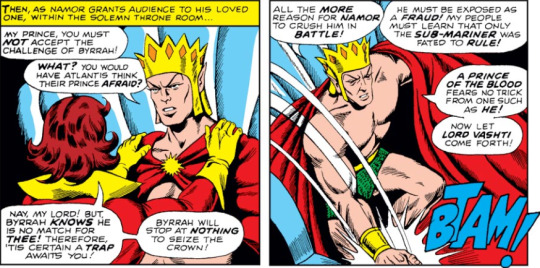
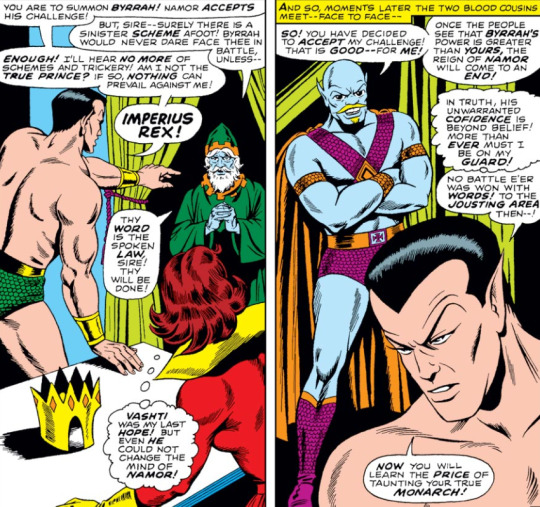
Incidentally, this is like the third trial by combat we've seen; seems pretty ingrained in Atlantean culture. Makes for exciting stories of course, but also lends context to Namor solving things by insisting on fighting about it since he sees himself as embodiment of his culture.
At any rate, it doesn't take long for Byrrah to start using loopholes to gain an advantage on Namor. Namor has advatages of his own, of course, but Byrrah was two steps ahead, and doses Namor with a strength-draining chemical applied via saw-fish. Ah yes, oldest trick in the book, saw-fish injection

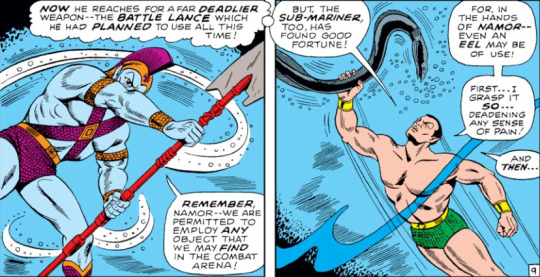
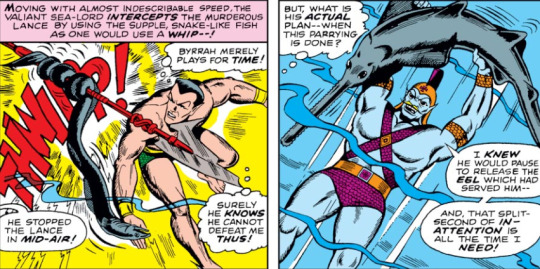
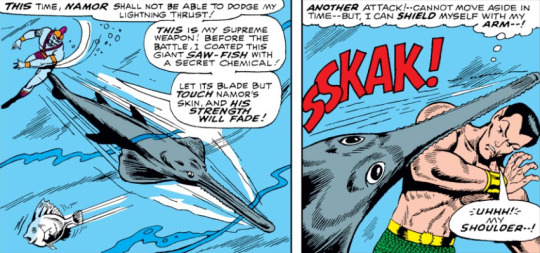
Now weakened, Namor is unable to take down Byrrah, who takes the offensive and delivers the knock-out blow on Namor. Imperius Rex?
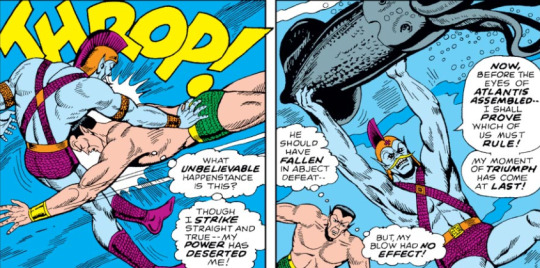
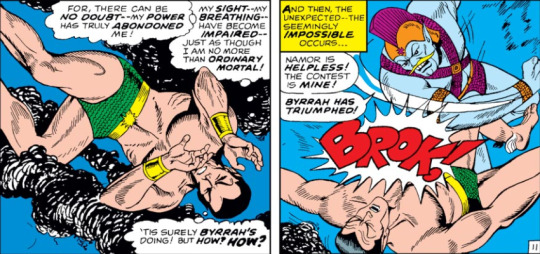
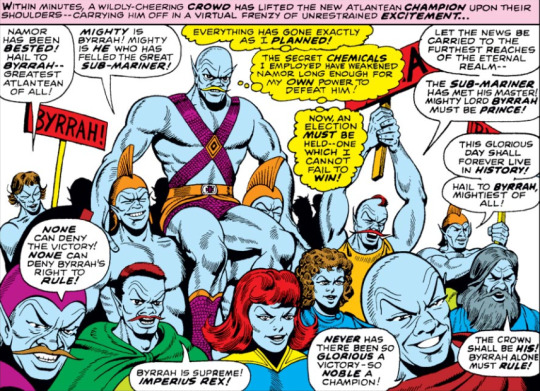
Namor is devastated, of course. But not because of his loss so much as that the people have turned against him and cheer his enemy. Dorma and Vashti try to comfort him, but Namor is worried that all his enemies will now team-up, dooming Atlantis and then the rest of the world!

Call me crazy, but I like the internal Atlantean politics stories, bringing back the racism against Namor that would pop up in the Golden Age and will pop up in future stories, delivered by a Golden Age adversary that's fun to dislike as a low schemer in Byrrah.
The art really works for the story too, Everett hasn't lost a step. The man knows Atlantis, and he adds in little details that remind me of the Golden Age Atlanteans/"submariners", which is cool to see if you've read Namor's oldest stories.
But, our cliffhanger left Namor at this low point, and NEXT we'll see what happens in the reign of Prince Byrrah of Atlantis in Tales To Astonish 91: Outside The Gates Waits Death!
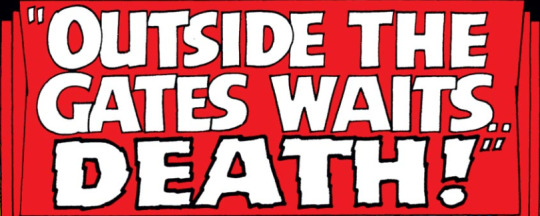
#submariner summer#submariner#namor the sub mariner#namor#namor the first#namor of atlantis#byrrah of atlantis#lord byrrah#byrrah#lady dorma#dorma#lord vashti#vashti#trial by combat#to be beaten by byrrah#tales to astonish#marvel comics#marvel#silver age comics
18 notes
·
View notes
Text
Fódlan Skill Analysis
Sword
Lance
Axe ⇊
Bow
Brawling ➝ Budding Talent
Reason ⇈
Faith ⇈
Authority
Heavy Armor ⇊
Riding
Flying
Griss is, first and foremost, minmaxed to be a magic nuke. His magic growth is the highest in the game (tied with Anna), but unlike Citrinne who has a similar role, he can can take a few hits, especially if those hits happen to be magic (in which case they might actually do nothing to him... that 50% res growth is second only to Hortensia and Pandreo). However, all of his other stats are either average or below, and unlike the others in the Four Hounds who swap between magic and physical weapons, Griss solely uses magic. This seems to imply that he's good at one thing and one thing only: spellcasting.
However, I'd like to look at this in the context of Fódlan's system.
BOONS
Reason: Spells are cast from tomes in Elyos without any sort of visible sigils, unlike Fódlan's spells, yet Engage also does make an effort to include sigils for spells while characters are engaged with Emblem Celica and Emblem Micaiah. While I don't intend to go into the inner workings of Elyos magic in this post and would prefer to leave that to an open discussion with other Elyos muses, the tentative idea that I've been holding onto is that Elyos magic relies on incantation. The tomes themselves seem to only have words on their pages, too. For this reason, I think Griss might have some trouble with the transition to the more mathematics-based Fódlan magic and greatly prefer the use of traditional tomes if he can get his hands on them. However, he can still manage to get by with his immense natural affinity with magic, and the elements almost appear to bend to his will with or without a sigil to focus them.
Wind magic is his preference. Drawing some inspiration from an old HC I wrote about Jugdral magic and incantations, this would partially be because the incantations for Wind spells are shorter. Griss has subpar dexterity and speed, which I interpret to represent character traits like a lack of attention to detail and an overall lax demeanor. He doesn't have the patience to memorize large strings of incantations for one spell, so the shorter and snappier the better. Additionally, he has a below average base build and an abysmal build growth, so heavy books aren't for him either. Despite his bulkier stats, we never actually see him use thunder magic in-game, so I can rationalize this as a desire to be able to get out of the way of an enemy attack if he needs to. To try not to get doubled every time, that is. Holding a heavy thunder tome might get him killed, and contrary to his behavior, dying a pointless death isn't on his wishlist.
Fire magic is his secondary choice. It's a well-rounded, safe pick for more devastating magic than what wind is capable of. He has some experience with thunder magic, but no experience with ice and whatever Sagittae is supposed to be. Dark magic is also out of the question, as that's a fell dragon-only talent.
Griss has been honing his magic from a young age. It was likely necessary for members of the fell church to prove their strength as soon as possible, although I headcanon that magic was something of a last resort for him. He wasn't good at anything else he tried, and really wasn't good at magic at first either solely because of the amount of rote memorization and focus it required. Once he got the hang of it though, he intuited his way through the rest. Magic for him is half feeling, which explains his incredibly strong but imprecise spellcasting.
Faith: While this encompasses both offensive and defensive white magic in Fódlan, this is solely the ability to use a staff in Elyos. Fódlan's version also uses sigils to cast, but its grounding in literal faith makes Griss feel much more at home with it than with Reason magic. Healing magic is second nature to him, and I've written previously about followers of the fell dragon learning first aid as a necessity for their violent lifestyle. Griss prefers this to status effects, although I headcanon that he has an impressive ability to deconstruct and figure out what a staff does simply by looking at its engravings. Paired with his fearlessness, this means he'd be the first to pick up a foreign staff and wave it around until something happened. Although most of the time he grasps its effect within the first or second try.
BANES
Axes: They are simply too heavy for him to get any satisfaction out of using. He can probably swing one once and then struggle to lift it again. Not to mention he'd probably never hit his target. Where's the fun in that? He knows his physical limits.
Heavy Armor: Similar to axes but with the addition that he'd rather dodge a fatal blow and wind up with a nice-looking gash than be completely impervious to damage. He wants to get hit, if his opponent has the skill to hit him. Armor would make for a boring fight.
BUDDING TALENT
Brawling: Excluding the DLC Enchanter class, Gauntlets/Arts are the secondary abilities of magic-only classes in Engage. Griss wouldn't have a hard time changing to the High Priest class, which already uses Tomes and Staves like his default Sage class, and I believe that the reason he wasn't designed as a High Priest despite his religious affiliation is because he isn't leading anyone. He's a pariah even among those of the fell church, and most of his character hinges on being a follower rather than a leader.
Nevertheless, the up-close-and-personal style that comes with using gauntlets would suit him. More ways to turn someone into a bloody pulp, and more ways for him to get busted up too. It's a win-win. Gauntlets are also used more in a boxing/brawling style in Fódlan than the martial arts style of fists in Elyos. Not to mention that they're light enough for him to handle, are easy to hit with (making up for his dexterity), and get two hits on initiation (making up for his speed). Surprisingly, Griss has an average strength growth on par with other physical units like Bunet and Goldmary (compare this to the 5% strength growth of Pandreo and Framme, 2 of the cast's 4 natural Arts users), so he'd actually be able to do some damage with his punches.
All Other Classes
Sword: Similar to gauntlets, swords are generally light enough that Griss could probably take advantage of them without much of a penalty. Daggers would be even better. However, using a sword properly usually relies on stances, and daggers require precision, and Griss would get bored of both.
Lance: Requiring form and also being a bit more unwieldy to handle than a sword wouldn't make the polearm a first choice.
Bow: Its inability to attack at close range makes this an unappealing option.
Authority: He can step up and lead a small group if he has to, but doesn't handle the leadership position well outside of what would essentially be middle management. He'll lead a battalion if he's acting on orders from a higher authority, but long-term planning and organization isn't his thing.
Riding/Flying: He could probably handle a horse or a pegasus if taught to ride, but prefers the freedom of moving on foot. Would probably be a bit too erratic and scare everyone around him, especially if he's in the air. Absolutely 0 sense of personal safety.
#out of character#headcanons#// was mulling this over for a few weeks now but just got the chance to sit down and write the thoughts out#// magic HCs are STC
12 notes
·
View notes
Note
Since you finished with chapter 6, I want to add on your chapter 6 view well mostly the first part. I would say that Cinderella was the one who got her arm scratch by Grimm and she was found by Meg as she helps her along with Deuce and Ace especially on finding Grimm until it is too late. The next few days turn out the same as the game as Vil having a meeting with the VDC participants same goes to Snow White, Aurora, and Ariel. Cinderella was just listening since they stay to take care of Cinderella. Jasmine also stayed since Jamil's relationship is doing well and wants to listen while the rest of the princesses are busy with other things outside. It all played out the same even the part of the Styx attacking. Everyone is devasting especially Cinderella, Snow White, and Jasmine as they witness Jamil, Vil, and Grimm being taken away.
Now moving on how the other overblot victims go. Alice is being taught how to horse back ride by Riddle with the help of Mulan, Merida, Sebek, and Silver when suddenly Styx attack. Riddle being kidnapped which shocked Alice as she tries to save him only to fail.
Leona was sleeping while Belle brought some snacks and Nala asking Leona to help out with her fighting when the attack came. Belle and Nala was surprised to hear that Leona surrender and even witness him being taken away.
Meg is a member of the board games clubs she is with Azul and Idia. Ariel, Tiana, and Elsa being there when attack came. The girls are hiding from the attack but witness the conversation between Idia and Azul. The moment they were taken away, Meg looks angry as she tries to follow but they already left.
And so the meeting came with temporary dorm heads and dorm leaders. Elsa and Tiana being representatives of their dorms as well as Meg and Snow White. They also learn that Crowley is kidnapped which saddened Snow White.
Snow White: Oh my, they kidnapped the headmage. How terrible...we need to bring him back just as much we have to being back the rest.
Of course no one sympathize regarding about Crowley but they did try to calm her down.
Once they learn about this, Meg is super angry about it especially when she follows Cinderella, Alice, Nala, Ariel, Jasmine, and Snow White about it. Epel also joins in with them as they aren't sure what to do until Rook came.
Now this is part that I will end since I am not sure how the plot goes since Rook and Epel are riding in their broomstick with Yuu tagging along. I wonder if would be just one or more girls. I also thought of Elsa and Anna joining since they are relate to the chapter 6 story too.
Absolutely everyone is distraught about the whole situation with Grim and then Styx and Dorm being destroyed. Its a lot and even the most optimistic of the girls are finding it hard to cope.
For Elsa and Anna and how they can tag along, look at this post for context. But if Elsa at least has magic and can use a broom, then she can fly with Anna on board. Or she uses her ice to propel a broom forward like an ice rocket. Whatever works.
But anyway, Meg runs into the Arendelle sisters, after Elsa goes to see if Rook will let some of them crash at Pomfiore. They run into Epel as well and find Rook as he is rushing off to look for Vil. Once Rook leaves, the four of them decide to go after Rook, not content to stand idly by. Meg is the least enthusiastic about this since she hates flying. She is holding onto Epel for dear life the time they catch up wtih Rook.
For the most part, tings go about the same as they did in the book. Elsa makes a patch of ice on the water for them to land on and Idia is flabbergasted that they came all the way out here.
Once Cerberus is down because of Ortho and Idia, the four of them find the housewardens like normal and the three princess split off with the others. Anna goes with Jamil and Leona. Elsa with Azul and Riddle. Meg with the Pomfiore trio.
On the trek downwards into Tartarus, they encounter many fights and talk. Anna brings up how her and Elsa were separated for so long. That like Leona she sometimes felt like the "spare" to her sisters "heir" (reference to a deleted song from frozen). Elsa ice magic saves all their hides from the magma titan, since her magic does not have the same cap or limits as Azul or Riddles does. Meg talks about how familiar a lot of this is. The underworld. Tarturas. Cerberus. All names she knows very well and the dread she feels because she has no good memories of any of it.
The book continues on as it did with the addition of the princesses help. They fight OB Idia and Ortho. They find Grim. Vil sacrifices himself. etc.
When everyone finally gets back, they are all greeted by their dormmates. The princesses all hug the returning trio and check on the other housewardens. (Jasmine tackles Jamil right after Kalim. Belle is asking Leona if he's alright. Tiana expressing that Azul had her and the tweels worried sick.) Malleus helps Vil return to normal and after a few weeks, Idia has Ramshackle repaired as promised and everyone welcome their new classmate Ortho as they all play games.

11 notes
·
View notes
Note
Is the lymond chronicles something I can get into if I know little of history and do not speak many romance languages?
Yes! I mean, it depends on your reading preferences and how you feel about being confused, but I certainly did!
That's my short answer! If you give them a try, I hope you find the series worth it, and I believe that what you like in a story will matter more than what you do or don't know going in.
My much longer answer, about my reading experience, is ....
In my case, I knew the names of monarchs and had a vague familiarity with the setting of the first book (Tudor/1540s Scotland and England). I speak a useful amount of French and a tiny bit of Spanish. Comparing experiences with friends, French was an especially helpful language to have, but I feel confident saying that I would have loved these books without it.
The thing about The Game of Kings (book 1) is that it’s just confusing. Dorothy Dunnett wastes no time in throwing political intrigue, multilingual references, and many characters at you. But even if you’re an expert in the history and in (modern and archaic) English, French, Latin, Spanish, Scots, and a little bit of Italian and German, you are faced with a protagonist who’s running back and forth across the border and interfering with that history … while guarding his goals and motives, explaining nothing about his past, and constantly quoting poetry from the personal library of a mind he doesn’t want to let anyone inside. Most of the people he meets don’t understand him, either.
For me, it was so rewarding when I finally started to learn what was happening and who he is, and after that the ride truly began…
I did not look up many references or translations and just kinda went with it. I was enjoying myself enough that I didn’t mind that so much was going over my head (especially if it was coming out of Lymond’s mouth), and within a few chapters I’d gotten invested in one of the characters (Christian!) and was entranced by a recurring joke/element. By the second section (let’s say … 175 pages in …), I was hooked, obsessed with a second character (Will!), interested in most of the rest, and having a great time.
There’s a character list in non-audio editions (the David Monteath audiobooks are very good, though), and companion books exist with translations/sources for many of the references. There are also various online recaps and chapter-by-chapter discussions. Looking things up yourself as you go along can reduce confusion, but be warned that many of the characters are versions of real people, so you may learn more than you want to know, such as when they die. 470-year-old spoilers, but still.
For me, the characters (complexity, parallels, relationships) and writing (playfulness, beauty, INCREDIBLE use of perspective and unreliable narration) are what make the books so good. They reward rereading, so, when/if you return, you’ll have another chance to go down some reference rabbit holes, and even if you don’t, you will understand much more.
The second book is generally agreed to be easier to understand! Also, there are elephants.
Perhaps more important than knowledge of history and languages is the reader's tolerance for …
angst. pain. agony. devastating reminders of prior angst and pain and agony
on the flipside, truly ridiculous antics, hijinks, and capers
many, many kinds of traumatic/potentially triggering content
bias/bigotry that shows up in characters’ perspectives and in general (not that newer media is free of this, but these books are from the 1960s and 70s, for context)
occasional elements that stretch the definition of historical fiction
revelations about your favorite authors’ influences (this was fun)
excessive reference to and description of Lymond’s beauty
half? a third? a large amount of the cast being in love with Lymond. This made for way more queer text than I knew to expect, which was great, but also … oh my god everyone is in love with him
the most bantering banter to ever banter, mostly, but certainly not entirely, courtesy of Lymond
Thanks for asking! If any of this raises more questions, ask again!
related: my lymond recs tag. There are mild and out-of-context spoilers, but these posts all sum up something about the series. :)
#lymond#lymond recs#questions#if anyone who sees this wants to chime in ... please do!#i love that so many people bring historical knowledge to the series/fandom#and/or end up diving into research because of it#i did not! history interests me but i really didn't know much about this era#so i eat that context right up#i also tend to have a very long wallowing-in-the-text phase when i find a new thing i love#so i'm still over here rereading multiple books at once because reading something else would mean reading something else!#eventually i'll probably branch out more than i have (a little bit of reading up on places/ people/ elements i want to draw)#much to learn as always#re: the language list ... there are probably more that i forgot#even in GoK#re: everyone being in love with Lymond ... that's probably not the most accurate way to put it but i was going for a tone...
5 notes
·
View notes
Text
ep 32 (3/3): BRUTAL

in the book it was said that wwx was 'half-dead with fear' when he heard this. I loved the phrase
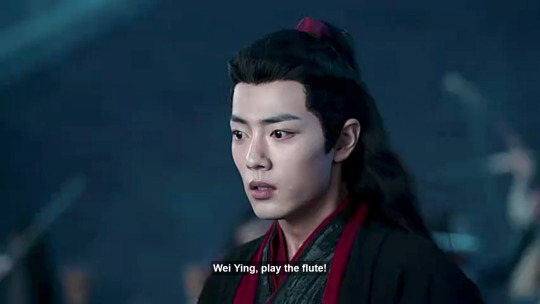
oh NOW you're telling him to play? lwj you're at some kind of crisis here you don't know WHAT you want
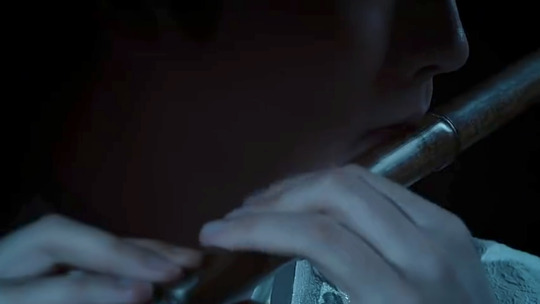
on my first watch I remember so clearly thinking 'oh teehee I've seen the spoilers there's nothing to surprise me only to GASP when this shot happened
I can tell it's su she's stupid upper lip and stupid nose too. he has very distinctive lower facial features


I was fully sobbing by this point so idk if I have any more commentary beyond *whimpering noises* look how terrified they are...that's their big sister

pretty fucked up that he's a jiang sect member

oohh, this shot is devastating. seeing him from across the battlefield, in this one instant, they're together again, and then-


this shot KILLS me. I know I talk a lot about wwx but jc loves jyl so much. he loves her so much. that's his big sister too. part of the reason the estrangement is so painful is because I get it. I get his anger and his violence and his bitterness. I don't agree with how he handled it, but I understand it
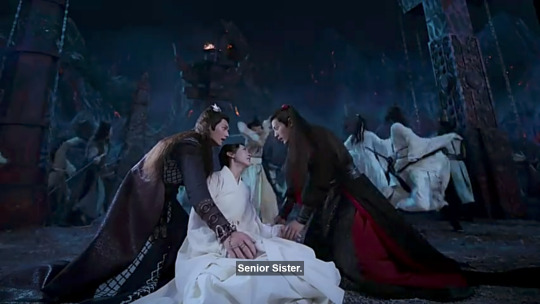
ohh this shot
honestly it looks a little wonky. there have been several shots this episode that have looked awkward. but who cares

I've been looking forward to the postres arc because it's not as relentlessly sad but I'm going to miss jyl SO much. look at her. she deserved the world



this is another line that slaughters me. she refers to wwx earlier at jinlintai, but this can also refer to their entire relationship. despite his closeness with jyl, wwx has often avoided true vulnerability or honesty with her. especially recently, for political reasons - stepping back, offering formality, running off, slipping away, bouncing her questions back to her. even with this person who's the closest he has to a mother, he couldn't sit down with her and entirely be with her in the way she wanted them all to be. and that hurt her! she wanted that closeness for all three of them, for the rest of their lives. oh jyl im so sorry you all couldn't make it in this lifetime

and this. fuck
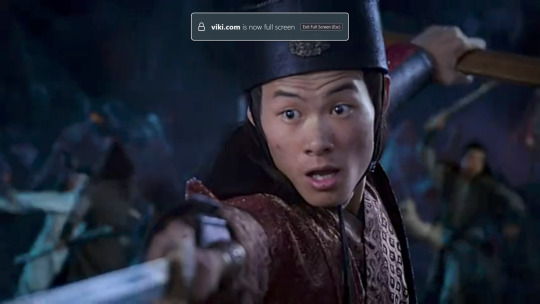
oh! that WAS the brother of the archer! it was mentioned in the book but I couldn't remember if it was canon to here as well. ugh, how appropriate it was for revenge

HEY. DON'T PLAY THAT
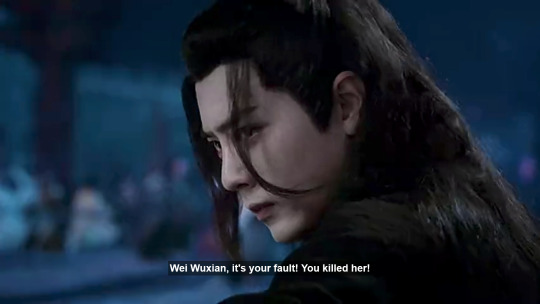
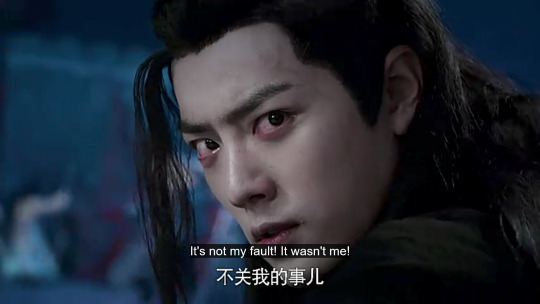
I've seen a really angry post (in the lwj tag no less) trying to put this situation into a modern context and it characterized wwx as super careless and irresponsible and uncommunicative, who was directly the cause of jyl running into 'a gang fight' and 'getting caught in the crossfire' idk it was super defensive of jc punching wwx but I think it misrepresented a lot of details unfairly. like this is a really complicated and painful situation for EVERYONE that wwx does bear some responsibility for, even if it happened due to other people's decisions besides him. and also he was trying to save innocent people from being murdered, idc how little info jc had about the state of wwx's core he DID know that and he simply didn't care or like try to extend some sympathy and support for him? that's like one of the most understandable goals...ever
anyway saying that wwx was directly responsible for jyl's death is simply untrue. she chose to come to the fight (HOW DID SHE GET THERE??? HOW DID SHE KNOW ABOUT IT??? WHERE'S HER GUARDS??? UNIMPORTANT). she came to look for him, sure, but he never wanted her anywhere near it. she was injured by something they thought was under wwx's control, true. but she died because she chose wwx over herself
that's not something he had any control over. and to hold that over his head when there was nothing he could have done once he realized what was happening, for someone who already bears a lot of guilt for simply surviving/being loved/being taken off the streets, it's just a horrifically cruel thing to put on him. and hey, grief doesn't always make sense. but I understand completely why wwx did what he did next. and after he comes back to life, it's even more obvious how much he needs his close relationships to be with people who don't hold anything over him or blame him for simply being alive or demand things from him that he simply can't give
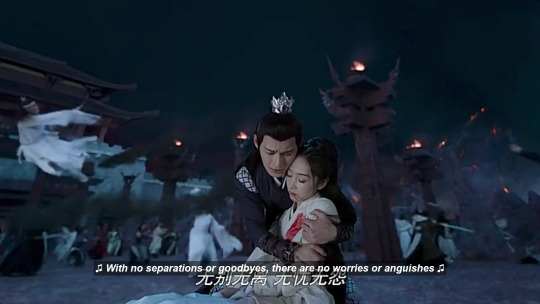
oh....

wwx kills this guy with his bare hands but like. who cares, right? no focus is on this man at all, curiously. jc could have blamed him instead. but he seems wholly convinced that every single bad thing that's ever happened to him was wwx's fault. to be fair, they don;t know about the second flautist yet so it doesn't look great for him, but also...you know how much your sister and brother loved each other! dude!
anyway i feel wretched
personal hightlights (what a joke. no this was a good episode)
god. "I want to stay with him a bit longer" and jyls' face when she sees wwx
madam jin breaking down and sobbing once she leaves the room
the heroic music setting wwx up as the villain of the story is a REALLY good touch
white paint on wwx's face <3
the cry-laughing
all of his lines on the roof but especially the ones about how he has to be careful who he hurts even though anyone can try to kill him with impunity and 'your hatred and admiration both come so cheap!' + the significance that has for wx
pulling out the arrow and killing the archer with it was BALLER
jc holding jyl in his arms is an unforgettable image
3 notes
·
View notes
Text
Dragon Age: Last Flight
Last Flight is the fifth novel in the Dragon Age series, written by Liane Merciel and published in 2014, just two months before the release of Dragon Age: Inquisition. Through the framing device of a mage refugee at Weisshaupt finding a hidden journal, the story explores the Fourth Blight 450 years ago, and the true story behind the extinction of the Grey Wardens' legendary griffons.
At 300 pages, this is the shortest of the Dragon Age novels (not counting Hard in Hightown which in our world at least is technically not long enough to be a novel). I do not think this is the strongest of the novels—I think it has some lore issues in particular, and its characters are on the whole less memorable. At the same time, I think it does add a lot to the canon in terms of establishing history and contextualizing in-game events. So this entry will be an exploration of both the book's weaknesses and its strengths.
This entry will contain spoilers for the whole story as well as for some bits of Dragon Age: Inquisition.
The Blights
This is going to involve a lot of preface before we actually get to discussing the book, but bear with me!
I think Origins does a good job establishing the stakes and scope of the Blight and the need to unite the land and all its people to face it. The darkspawn feel like a real threat, the Archdemon is scary, the Deep Roads hold secret horrors which add additional scale and dimension to the darkspawn threat. As the game progresses, you watch the Blight creep across the map, and some locations become inaccessible as they are overrun. It's solid worldbuilding for a stock fantasy epic. That the Blight doesn't really extend outside of Ferelden is fine for this story, because the scope of the game is Ferelden, and it is well established that if the Blight is not halted here, it will spread to the rest of the world. It feels as big as it needs to for the story Origins is telling.
So it's interesting to learn later that the Fifth Blight is actually the shortest Blight in Thedas's history, canonically ended within a year and never spreading outside Ferelden beyond a few isolated darkspawn outbreaks.
If you read all the Codex entries when you played Origins for the first time (which I definitely did not), you learned that the First Blight lasted nearly 200 years and nearly collapsed two civilizations. Both the Tevinter Imperium and the dwarven empire were devastated by the Blight and would continue to decline even after its defeat. This of course can be accounted for by the fact that at the time, no one yet knew how to kill an Archdemon. Every time Dumat was slain, it would be reborn and the Blight would rage on, until at last came the creation of the Grey Wardens, and eventually Dumat was permanently killed.
With the Second Blight, they cut that down to 90 years, and by the Third Blight it was down to 15, and then 12 for the Fourth. A decade of war is still devastating, but it's not civilization-destroying on the scale of the First Blight.
There are reasons for the Fifth Blight being ended so quickly, beyond our heroes getting really, really lucky at the Battle of Denerim. (If Riordan hadn't managed to damage the Archdemon's wing, grounding it atop Fort Drakon, or if all of the 3-4 wardens present had been killed before its defeat, Urthemiel very well might not have been killed that day.)
For one, the Fourth Blight is said to have wiped out so many darkspawn that some believed they would never return, and it does seem to have taken them quite some time to replenish their numbers again. More than 400 years passed before the next Blight arose, and over time it must have felt more and more unlikely that another would come. It becomes easier in that context to see how the horrors of the Fourth Blight fell out of common memory, and how the Wardens fell out of favor, especially in Ferelden—which was not even a nation yet at the time of the Fourth Blight.
For another, it is revealed in Awakening that the Fifth Blight was actually begun by the Architect's failed attempt to perform his modified Joining ritual on Urthemiel in order to prevent further blights, resulting instead in Urthemiel being corrupted and rising as the next Archdemon. It's never explicitly stated in canon, but my guess is that had things taken their "natural" course (if such a thing can be called natural), the darkspawn might have amassed much greater numbers by the time they found and corrupted Urthemiel, thereby delaying the Fifth Blight but making it ultimately more devastating when it occurred. So I think it's possible that the Architect's interference, even though it failed in its goal, might still have saved lives.
The Fifth Blight was so short that we didn't witness the full extent of what darkspawn invasion does to the world over time, and this we get to see in more detail in Last Flight: barren ground, dead crops, sickly animals and children, even deadly storms. Sickness and starvation kill more people than darkspawn swords. A Blight is war, famine, and plague all rolled into one.
Weisshaupt and the Anderfels
One thing I was very excited about in reading this book was getting to see Weisshaupt Fortress firsthand, as previously we'd only heard about the famed Grey Warden headquarters secondhand. By extension we also learn a bit about the Anderfels.
Our point-of-view character for the present-day frame story is Valya, a mage from the Anderfels' Hossberg Circle, arriving at Weisshaupt with a small group of fellow mages seeking refuge from the mage-templar conflict quickly spreading across Thedas. With the Fifth Blight ended, the Weisshaupt Wardens are in no great hurry to put new recruits through the Joining, and instead put them to work helping with research in the fortress's library, sorting through old documents from the previous Blight.
In said library stands a memorial to Garahel, the Hero of the Fourth Blight, which I thought was pretty neat. It was also cool to learn that it was an elf who killed the last archdemon, and we'll learn more about Garahel and even more about his sister Isseya, our point-of-view character for the Fourth Blight storyline.
We also learn that the Weisshaupt Wardens are investigating intelligent darkspawn like the Architect, which is not very relevant to this story but was a piece of continuity I appreciated.
We are told, from Valya's point of view, that "no one, absolutely no one, save the truly heroic or the truly desperate, wanted to become a member." I think we already know just from what we've seen in the games that this isn't strictly true. But I also wonder if it's more true in the Anderfels—if the cost of becoming a Grey Warden is more common knowledge here.
Similarly we are told in the flashback part of the story, from Isseya's point of view, that "Everyone who had ever heard of the Grey Wardens knew that someday the darkspawn taint that the Wardens absorbed during the Joining would overwhelm them." So… perhaps that was common knowledge at the time of the Fourth Blight? It certainly isn't in the south in the present day, though again it might be in the Anderfels.
We're told early on that "By tradition, the Wardens took only one recruit from each Circle of Magi in Thedas." One at a time only, to be replaced when they die? Does this apply all the time or only in peacetime? I have no idea, and it isn't explained further.
At one point in the frame story some letters arrive at Weisshaupt, and it seems the Wardens of other nations write to Weisshaupt for supplies, which seems a little inefficient, frankly, given the sheer distance and difficulty of travel. On another note, the unnamed arl requesting a personal guard after his wife insisted she saw a genlock in the cellar amused me greatly, because I could just imagine the arl going to the poor beleaguered Warden-Commander of Ferelden and being told that if he really wanted his own personal contingent of House Wardens, he was more than welcome to write to Weisshaupt and ask for them.
In this story that Ferelden has a new Warden-Commander, which I believe lines up with the default world state BioWare uses for the novels and comics, in which the Hero of Ferelden is dead.
I think this story is especially compelling in how it establishes some of the terrible choices the Wardens have had to make in order to save the world. An early sequence in the flashback portion involves the Grey Wardens facing the cruel reality of choosing who to evacuate from Antiva City. Nobles have land, armies, and coin to aid in the war effort. Peasants have nothing to offer and will be left to die, and though the Wardens find this distasteful, they don't have enough time to save everyone, and this influences Isseya's decisions later on. The hard choices the Wardens must make are a major theme and I think one of the strongest aspects of the story.
Additional Worldbuilding
It was also really cool to see more of Antiva, which is where the Fourth Blight began. Antiva City on Rialto Bay sounds just beautiful, and that's sad when you realize you're seeing it just as it's about to be destroyed. Antiva was caught off guard by the Blight and quickly overwhelmed, and then the darkspawn spread south into the Free Marches which were not nearly unified enough to mount a proper defense.
They rebuilt after the Blight, of course, and I really hope we get to see Antiva City in-game one day and that we get to see more of it than we saw of Val Royeaux.
I do wish that we got some effort put into showing us that the fashion of the Exalted Age was different than what we see 450 years later, but nope, from what is described it appears to be exactly the same Origins-era fantasy-medieval aesthetic. On the other hand I am pleased to see the story acknowledge that language would have changed over the centuries.
Lore & Continuity Issues
Caronel is a Grey Warden side character in the present-day storyline. He is memorable mainly for the fact that I was immediately suspicious of him as soon as he said he became a Grey Warden during the Blight in Ferelden. This makes no sense unless he either left the country and underwent the Joining elsewhere, which is strange since Ferelden is where the Blight was, or he didn't actually join until the Blight was ended, which is also strange because the Ferelden Wardens desperately needed rebuilding after the Blight given that they only had 2-3 people left and their first group of reinforcements from Orlais were slaughtered to a one at Vigil's Keep within six months. I honestly thought Caronel was lying, like he was some kind of proto-Blackwall, and that either he hadn't yet joined or was concealing his true origins for some juicy reason. But nope, it just never comes up again and never pays off.
There is some very weird stuff in this book about aravels, the wheeled wooden "landships" Dalish clans use to move from place to place, drawn by halla and able to move swiftly through the forest through magic. Her limited knowledge of the Dalish and their aravels leads Isseya to devise a similar scheme for evacuating civilians from cities threatened by darkspawn, using modified boats and griffons. This is clever, and an interesting plot point.
The first weird thing is that Amadis doesn't think aravels are real. I can accept that perhaps she's never seen one, having perhaps never encountered a Dalish clan. But aravels are universal among the Dalish, and according to their Codex entry, so well-known to humans that their approaching flags are considered a warning to stay away. I guess it's possible that in Exalted Age, the Dalish maybe have been scarce enough in the Free Marches that their aravels might have become mere myth, but it's weird, and I'm not sure why it would be true.
The second weird thing is that these characters (and by extension the author) seem to believe that aravels fly. As in, fly high in the air, like a sleigh drawn by reindeer. This cannot be true. Halla are not winged creatures; they don't fly. (Unless we're counting that one glitchy halla in the Brecilian Forest.) Aravels have wheels on them. Humans call them landships, not airships. I don't even consider this to be debatable; it has to be a mistake, and I parse it as a misreading of the Codex entry, where "flying through the forest" is a figure of speech and "the sails of our aravels flying above the tops of trees" pretty clearly has to mean that the sails are visible above the trees as the aravels pass, not that the entire aravel is literally flying.
That Isseya decides to fly the refugees to safety using magic and griffons is all well and good, but to suggest that Dalish aravels fly… it's just a mess, and there's no way that was supposed to be canon from the start.
And then there's the blood magic lore, which is getting its own section.
Blood Magic
The blood magic lore was probably my biggest issue with this book. I can write off Caronel as a liar, I can write off the flying aravel nonsense as these non-Dalish characters having misconceptions about aravels. The blood magic stuff has much greater ramifications to me, because it touches the very fabric of the universe.
The first line that caught me off guard was "Blood magic required considerable sophistication." I thought, really? Because it sure seemed in Dragon Age II that a mage in a fit of desperation could just cut their hand with a knife, spill their blood, and immediately summon demons. This was never indicated to be a school of magic that required "sophistication," whatever that means, especially when it is so often a last resort of the desperate.
It also appears in this story that to control someone's mind with blood magic requires drawing their blood, not just any blood. While this would make sense in and of itself, I am not sure whether it lines up with what we've seen elsewhere, as the general attitude seems to be that if a blood mage is about, anyone they've had contact with could be in danger of having their mind influenced. Ordinary people could be mistaken about this, but not templars, whom we've heard speak of the dangers of blood mages being able to control the minds of those around them.
But I was really pulled up short by the part where Isseya picks up on Calien using blood magic, and confronts him:
"You're a blood mage. I can see when you're casting spells without touching the Fade."
This is where I stopped and said: Wait, WHAT?
This is… there is just so much to unpack about this, and more you think about it the less sense it makes. If blood magic doesn't touch the Fade, wouldn't that make it less dangerous, and not more, if there is no contact with the realm of demons? Why does blood magic attract demons if it has no connection to the Fade? If blood magic doesn't touch the Fade, why does it thin the Veil, which we know to be true because it's a very important piece of worldbuilding for the entire series?
Furthermore, the Fade is supposed to be what gives mages their abilities in the first place. It's why dwarves and Tranquil can't do magic. If blood magic has no connection the Fade, then dwarves and Tranquil and anyone else should be capable of performing blood magic.
The book even kind of contradicts itself on this stuff later, because we see Isseya reaching for the Fade as she prepares the blood magic ritual to Join the griffons. In the most explicit example, when she uses blood magic to enter a griffon's mind to find out what's killing them, we are told, "She grasped the Fade." So does blood magic touch the Fade, or doesn't it?
Thing is, this piece of lore is... sort of? maybe? affirmed by Solas in Inquisition, when he says that blood mages have more difficulty entering the Fade. (Never mind that Merrill never seems to have any trouble entering the Fade during "Night Terrors.") Which is not exactly the same thing as "Blood magic doesn't touch the Fade," but it could be related. So, I think there is something to this, regardless of how confusingly it's presented in this book.
I think what we ultimately have to take from this is that using blood magic makes it more difficult to enter the Fade in spirit, but… also potentially makes it possible to enter physically, if enough blood can be spilled to tear the Veil open. Why that is the case, I don't think we yet have enough information about the Veil and the magical qualities of blood to say. Maybe we'll find out. As for blood magic touching the Fade, I think the point is supposed to be that blood is a separate source of magic from the Fade, not merely a fuel for it like lyrium (which is also a kind of blood, but we're not getting into that here). It's just not handled very well. And as for what is required for mind control... your guess is as good as mine.
(Tangentially, there's also mentions of the Archdemon creating some kind of magical vortex in the sky during battle, and Isseya notes that its power does not come from the Fade. This I think ties into the face that darkspawn draw magic from the Taint, not from the Fade.)
Initially I just hoped all the blood magic stuff would be quietly forgotten along with flying aravels, but having realized some of it was confirmed in later canon, I think that much at least is here to stay. So I don't think the blood magic lore here is entirely erroneous, but the way it's presented is kind of a mess.
General Writing Weaknesses
Very embarrassingly, when I returned to this book about a month after finishing it to do this write-up, I could not remember the name of the present-day point-of-view character. (It's Valya.) This is not a problem I had with any of the other novels, and I think it's representative of the fact that a lot of the characters just weren't as memorable or compelling. The one I remember best is Isseya, and it's not because she had a particularly distinct or engaging personality but because her actions were central to the story. If pressed, I don't think I could really tell you anything deeply personal about most of the side characters, and despite them being from different time periods, I kept getting Calien and Caronel mixed up to the point that at one point I forgot Calien wasn't a Grey Warden.
And in such a character-driven fandom, I think the unmemorability of these characters is born out by the fact that I'd never heard of any of them or the book itself before I started actively seeking out every piece of Dragon Age media in existence. I've only ever been on the edges of the wider Dragon Age fandom and I'd heard of, for example, Rowan and Fiona and Rhys and Michel, at least in passing before reading their books; I've never heard anyone talk about Isseya or Valya.
While the frame story of the mage and templar refugees sets the story clearly in the time period right before Inquisition, I don't feel like it particularly serves this story, which is not about the mage-templar war, and the references to it, including the tension between the refugees at Weisshaupt, don't really go anywhere or have any payoff. Valya didn't need to be a Circle refugee and her companions didn't need to exist, basically; all they do is add more superfluous characters who don't matter to the story. Isseya's journal could have been discovered by any Grey Warden initiate who was both a mage and an elf, and I actually think it could have been more interesting to see the story of how the Wardens wiped out their own griffons through blood magic unfold through the eyes of someone who's already undergone the Joining and has that sunk cost in believing the Wardens heroic and good.
Valya suspects that the story the Chamberlain tells her about how the griffons died out is a lie, at a time in the story when she still has no reason to suspect that. It throws some intrigue to the reader, sure, but from a character point of view it's not believable, and Valya is too underdeveloped a character for it to make her seem smart. Instead it just feels like the writer wants you to know there's more to the story.
And then there are just some language issues I have with the writing, things that I think it behooves anyone writing in a fantasy genre to be aware of. There is always a certain level of suspension of disbelief required for fantasy, and all language derives in some way from the cultures it arose from and reflects the world in which it's used, but if the origins of a word are too obviously not of the fictional universe, they become immersion-breaking. I call this "the Brussels sprouts" problem. In a fantasy world where the country of Belgium and the city of Brussels do not exist, you cannot have a vegetable called Brussels sprouts. You can have that vegetable but you can't call it that without risking the audience's immersion. In this cases, the author uses the adjective "spartan," as in "a spartan respite." Most people know what Sparta was and who the Spartans were, and this word absolutely does not belong in Dragon Age.
There's also this one simile, "studded with arrows like a ham stuck with cloves," that stuck out to me, not because it was out of place in the universe necessarily—Thedas has pigs and it has spices, fine—but because it just seemed kind of uncreative to me. Like, oh, I guess people in this fantasy world with dragons prepare and eat ham exactly the way we do. Cool, I guess?
Merciel also has kind of a problem with unnecessary epithets.
In this book Dragon Age continues to be sort of iffy with its portrayal of transgender characters. They arguably did finally do better with Krem in Inquisition, but this is something that in general the franchise has a history of fumbling (see my post on the first three graphic novels for more on that). This book has a character named Lisme, who seems to be what we would describe as genderfluid. A huge deal is made of Lisme's presentation being dramatic and costumey, which seems both highly impractical in wartime and not necessary to establish the character's genderfluidity. I mean don't get me wrong here, if Lisme wants to dress up like a drag queen to fight darkspawn, I for one support her, but I also question the choice to write the character that way, as well as to have the narration tell us that no one knew "which was the truth" like his gender presentation is a lie. For a franchise that prides itself on the inclusion of LGB characters, Dragon Age has been sort of behind the 8-ball on trans representation, but the trend at least does seem to be an upward one--and I hope that continues.
There are couple of issues I'm going to mention which also apply to other Dragon Age books and so it's going to seem like I'm singling this one out unfairly. If I ignored them in previous books it's because they weren't enough of a distraction to take me out of the story, but they were still present and I will mention them briefly here.
We do set up the obligatory het romances real early; this is a thing in nearly every Dragon Age novel (hats off to The Masked Empire for breaking that mold) and while I wasn't invested in most of the characters, I did enjoy the thing between Amadis and Garahel, which of course ends in Garahel's heroic sacrifice. (Amadis despite not getting a ton of character development was still probably my favorite character in the book.)
There are moments in these books when it feels like the writer grabbed at the first name that popped into their head without thinking about why it popped in there. Like Asunder having a major character named Adrian mention an Enchanter Adria who never appears or comes up again. Or in this case, a character name Fenadahl, not to be confused with the elven Tree of the People, the vhenadahl. I understand that in real life sometimes people have similar names, and sometimes names sound like things, but in a book it's distracting and if you don't have a reason to do it and you aren't going to lampshade it in some way, you should probably avoid this sort of thing.
This is a small thing but it also represents a hole a lot of franchises seem to fall down as they age and expand, and one I fear Dragon Age is also succumbing to: the pressure to utilize characters that fans have heard of before. (I think this is way more of an issue in Inquisition and some of the comics, but that's another entry for another day.) In short: I know fans like to hear familiar names, but Brother Genitivi does not need to be the only human historian in all of Thedas. There can be other scholars who have written books. Mix it up a little.
Strengths!
I want to go out on a positive note, so let's finish with some more general things I liked!
While it initially feels a little dramatic the way Valya finds the super secret Grey Warden journal by following a hidden message on an old map to a secret hidey-hole in a stone wall, instead of just finding the journal in a trunk full of Fourth Blight stuff no one's had time to sort through, it does turn out to have been hidden that way for a reason, and specifically so that a mage and an elf would be most likely to find it, so that worked for me.
I mentioned that Amadis is my favorite character and it's mostly for this:
"Who are you?" Isseya asked. "You're not just an Antivan lady. Not by the way you handled those blades."
Amadis laughed. "You must not know many Antivan ladies."
She goes on to explain that she's not actually Antivan, she's from Starkhaven, but it was a great line all the same.
The battle descriptions are great! I tend to find the battle scenes the most boring parts of these books, but this was an exception. The griffon-mounted battles were really fun and exciting. It becomes clear in this story how much differently a battle feels when you're not even trying to kill an Archdemon at the moment, only escape.
Blood magic stuff aside, I also like the way Merciel describes mages doing magic as reaching for the Fade, opening themselves to it, weaving threads of magic and so forth. It's more visceral than Gaider's descriptions ever were, and makes more vivid what it might feel like to do magic in this universe.
I liked the mention of the Wilds flower from Origins that can cure blight sickness (at least in Mabari), and it makes sense that it would sound like a fairy tale in the north because the flower doesn't grow there. That was a nice piece of continuity.
I think it works well that Valya knows the outcome of Isseya's story before we do, allowing for some foreshadowing in the frame story, with Valya saying "She did terrible things" before we know the extent of those things.
And I like the griffons! I like the descriptions of them, the bonds they have with the Wardens and their individual personalities, and I cared about them enough that I was genuinely sad about the sickness taking them even when I knew from the start that they were all going to die. The surprise came from the discovery of the hidden, magically-warded and unblighted eggs, and the revelation that griffons are going to return to Thedas! That's very exciting to me!
Final Thoughts
I think Last Flight is one of the weaker of the Dragon Age novels, but I still think it's valuable for some of its worldbuilding, and particularly for its portrayal of how much the Blights have cost Thedas and what has been sacrificed to stop them. It's almost unfair to compare it to, for example, The Stolen Throne, which had no continuity to break when it was written, and while it also didn't have the strongest characters in the series, their proximity to the first game automatically added interest to their story. Last Flight comes later in the series and thus has a lot more continuity to build on, and I can appreciate the added challenge of that, even as I wish the lore had been vetted a little more carefully. It doesn't have the strongest characters, but I can appreciate it as a world-driven story more than a character-driven one, even if I think that's a little out of step with the rest of the series.
It's not my favorite, but I enjoyed it and I think it's worth reading.
Addendum
More recently, I watched Ghil Dirthalen's video series about this book on YouTube. She noted some of the same issues I did, and she added one piece of context in particular: Merciel wrote Last Flight on a pretty tight deadline. She also shares a few quotes from Merciel from the old BSN forums, offering some lore-questionable justifications for certain writing decisions, and also mentioning that she hadn't read World of Thedas when she wrote the book. (Ghil also catches some lore issues that I didn't, so really, you should go watch her videos, part of her Book Emporium series; it's good.)
And given that this book doesn't actually set up anything that happens in Inquisition, I'm not sure why it was so important for BioWare to publish it when they did; it could just as easily have come out after the game. But that time limitation probably explains a lot. And knowing that just confirms for me that we probably shouldn't favor this book over other sources of lore where they conflict.
29 notes
·
View notes
Note
talking about jilypad, I have always wondered what would happen if suddenly one of them is taken or walk away, like stop being in that relationship, be it by choice or not. James is the balance between Sirius and Lily i guess, so if he is the one who deserts the relationship, Sirius and lily 's relationship probably will take a v platonic turn. Tbh I think S and L are platonic anyway but without james it would turn into a comfort thing, like Sirius brewing tea for a sleepless sad lily or lily slowly persuading an absolute devastated padfoot to come out of underneath James' bed sheets and turn into his human form to at least eat something. I think it would be easier for them if it is lily who has deserted the relationship. I mean, james and Sirius are codependent and in sync, so they can fix each other after sometime. Not that it won't hurt for them or lily is less important in the relationship but because they know how to handle each other's feelings. But when I think about Sirius being the one who deserts the relationship, I can't help but to think that James would blame himself constantly, thinking he had not given enough love to Sirius and feeling guilty ( specially if Sirius has moved away on his accord) I can imagine him panicking because of Sirius's sudden absence, trying and spend time on things Sirius likes ( to distract himself from driving himself crazy albeit unsuccessfully) like how a motorcycle works or buying muggle men fashion magazines, just to show Sirius how important he ( and his likings ) are to James later. He is a type who never accepts not being with Sirius. Like, he involved Sirius in his private life and marriage by making him harry 's godfather in the books. God forbid though, if Sirius is not there because he can't be there (for whatever reason ) , James would probably end up silent and numb for the rest of his life. After all this rants, now that I am thinking, it is lily who balances this two not James. Because Sirius and James practically ignore all the laws of physics in codependency. I would have said the prophecy in the book 5 ( Neither can live while the other survives ) is about them with slight change of neither can live while the other one is dead ( or while the other is away or sth like that)
:O
ngl, i’ve never considered this bc it’s on the road to angst and my heart can’t handle it but now that i’m thinking about it…
i actually can’t see a lily/sirius working without james tbh. i mean, i’ve read the ship and it can definitely be written well but with how i see j & s, it just doesn’t compute. for one, l & s are way too similar and james is the balancing act between the two. also, sirius wouldn’t ever do anything that could hurt james & being w someone that james liked w/o him being there? man, idk. i think i also struggle w seeing sirius in a relationship that’s not james (i kinda see him as needing an extremely close bond before he’ll be in a relationship & there’s no way that happens organically w lily unless it’s a jilypad scenario). if james does, though, i can definitely see them clinging to each other for comfort, doing things like u mentioned. both of them are trying (unsuccessfully) to fill a gap that refused to be filled.
if it’s sirius who leaves in the relationship, tho? especially after they’ve had a taste of what it’s like to be together at the same time? i absolutely don’t think james would be able to go on as before. i mean, in a jily + sirius scenario, he’s already relegated s to a particular position, right? and he knows he’ll have him like that always. i’ve talked ab how i think james is super possessive of sirius and wants as much of him and his time/attention he can get so once he’s gotten a chance to have s in a relationship context, he would absolutely not want to give it up. he’ll definitely fixate on sirius to the point that james/lily won’t work either, i think.
this is gonna sound mean but i don’t think lily leaving would have a lot of impact on their existing relationship 💀 i mean obv there’ll be grief and sorrow and anger/hurt etc but ultimately, they can bounce back from it because she was transient in comparison to these two. if it’s like a,,,post harry world, there’ll be an added layer of grief bc they’re also losing the mother of their child in addition to a partner but i still think they can pull through w/o devastating consequences just bc of the strong bond they already have.
#sirius black#james potter#lily evans#jilypad#ngl my mind cooked up so many angsty scenarios for this that i didn’t put here#see aforementioned lack of filter due to…reasons#also i dont usually think of sad prompts but now i am#and god there’s so many ways u can torture sirius#or lily#but that’s the obvious way i think#but the evil part of me rly wants that to happen lol#i wrote this answer over three days and i feel like it’s so disjointed lol#but yeah. there’s so many potential dynamics w jily#it’s interesting to think about#pen’s asks
11 notes
·
View notes
Text
BLOG 3: SUSTAINABLE DEVELOPMENT GOALS (SDGs)

My favorite of the SDG 2030 goals is number 5, Gender Equality. Across different cultures, the concept of women's rights and the role of women in society is varied. Regardless of where they are in the world, it is important for women to have rights and be treated equally. I think that including this in the SDG goals is important because there has been a lot of progress in women's rights in the past century, but that does not mean we can become complacent. Just because women have the right to vote and own property does not mean that the patriarchy has been dismantled in any big way.
Just because women have obtained some basic human rights does not mean that they are being treated equally.
"Tourism can empower women, particularly through the provision of direct jobs and income-generation from SMEs in tourism and hospitality related enterprises. Tourism can be a tool for women to become fully engaged and lead in every aspect of society." (SDG 2030 Goals)
While I don't have any tourism related career goals, I am invested in seeing women as leaders in society. Doctors aren't just men any more. This kind of female empowerment is something that is important to have represented in all career fields, including tourism.
xxx
Of the movies I watched, both impacted my view of tourism and how unsustainable practices are threatening to the culture and the physical landscape of the places that are not responsibly managed. My heart dropped into my stomach when I saw the untouched beach of Haad Rin turn into a bucket-drinking spring breaker's paradise.
I had not really thought of the infrastructure of tourism before, and all of the seemingly little things that have a big impact related to a large influx of people. Waste management, another important SDG Goal, was the main issue that I had not thought of in the context of tourism. Especially on an island with limited access, there are strict limitations to the amount of matter that can be transported to and from Haad Rin in any capacity. The sheer accumulation of garbage and human waste that was simply dumped on the beach and in the water because there was no where else for it to go is terrifying!
In contrast, the dedication to preservation and sustainable tourist practices in Nepal was a shining example of how things can go right. There is the capacity to utilize tourism as a means of income without sacrificing the native lands and people. They use tourism in such a way that they can actually preserve the beautiful piece of the world that they live and improve the quality of life for the wonderful people who live there. If the rest of the world took a page from Nepal's book on sustainable tourism, we wouldn't have the devastating cautionary tales of places like Haad Rin.
My dream travel destination is Italy, which is not a member of the United Nations. This was surprising to me, though I can't say I wold have been able to confidently list members of the United Nations before researching them for this assignment. I am motivated to travel by the idealism of peace, to exist quietly in a place other than my own and experience a new place for the sheer joy of doing so. I think that there are many different motivators for travel, but no matter what they are, they all pull back to finding new joy in some capacity.
It is our responsibility, as tourists and humans, to travel sustainably. Everywhere has something to share. We have to be careful not to take so much that there's nothing left to give.

0 notes
Text
My writing on Women, the State, and Revolution.
Wendy Goldman’s Women, the State, and Revolution is a thorough analysis of the circumstances of women during the 1920s USSR, with a focus on the state’s attempts to create legal and economic gender equality. Space is also dedicated to the condition of children, focusing on children who lived on the street, and to the ultimate fate of Bolshevik attempts at radical reform in the 1930s. Throughout the book, the contrast between the radicalism of the Bolshevik imagination and the limits of what was possible under the material conditions of the time is a constant theme, as repeated attempts at reform were challenged by the poverty and “backwardness” of the USSR.
Goldman begins with a brief summary of feminist history up to the 1920s, with a specific focus on Marx and Engels. The most important idea here is that the context of social relations is determined by the economic relations of the time. The shift from tribal society to feudal and agricultural societies reduced women to a subservient role, and the imagination of historical ‘feminists’ was consequently limited. Only with the advent of the capitalist system could questions of women’s liberation be raised and discussed, and in Marx and Engels’ view, only with the advent of socialism could they be answered. Upon the success of the October Revolution, the Bolsheviks quickly established the equal rights of men and women under the law, a legal stride forward that the rest of the world still struggled with. The socialist promise of economic equality would be far more challenging to deliver.
Goldman splits the Bolshevik program for women and families into four major interconnected components: the liberation of women through waged labor, the replacement of marriage with a free union based on mutual love and respect, the socialization of household labor, and the withering away of the family. Arguably the most essential of these was waged labor, as the Bolsheviks identified women’s dependence on their husbands as a cause of many of the issues women faced. War communism suggested a positive outlook for women, as men left to fight the civil war and women took their place in the factories, but this would prove to be short lived. After the conclusion of the war and the establishment of NEP, unemployment skyrocketed and men returned to take their jobs back. The ideal of women as wage workers, independent from their husbands, would not be realized in the 1920s.
The Bolsheviks introduced civil marriage largely as a shot at the church, and many of them ultimately believed that marriage would become unnecessary. Romantic and sexual unions between men and women (and only between men and women) would be based on mutual affection and respect, and there would be no need for the intrusion of the state into these private affairs. In the same vein, the Bolsheviks legalized no-fault divorce as a means of ending bad unions. This utopian view ran into the unfortunate reality of women’s economic situation, where despite the efforts of the party, they were still overwhelmingly dependent on their husbands. The Bolsheviks were forced to enact a system of alimony to allow dependent wives who had been abandoned by their husband, often with children, to extract economic support. This system was overburdened and ineffective, often running up against the simple issue that men were too poor to support their ex-wives and children, especially if they took another wife. The result was devastating for women and children.
The Bolsheviks also hoped to socialize all housework, with domestic labor being communalized compensated instead of being done by unpaid housewives. While this ideal was enacted partially during war communism, after NEP was established, it became clear that it was simply too expensive to socialize housework in this way. The “subsidy” of unpaid housework by women was too costly to remove.
Most radically, the Bolsheviks predicted that in time the family would wither away as various functions of it were replaced by the state. Most crucially, they hoped to socialize childcare, placing children in homes that would raise them collectively. This ran into the same issue that socializing of housework did. The resources to create massive state programs to raise children did not exist in the 1920s USSR. NEP gutted funding for social services, and amidst the insufficiency of what remained, Bolsheviks were forced to return to the family as a means of raising children the state could not care for. Adoption, initially outlawed, was reintroduced.
Goldman dedicates the final section of the book to the 1930s USSR and the brutal end of the libertarian dreams of the 1920s. Women finally achieved near-equal participation in the labor force, but only after real wages had fallen so significantly that a married couple’s combined salary would only purchase as much as a single man’s salary in the 1920s. Marriage was strengthened, divorce made more challenging, and legal punishments for failing to pay alimony became more punitive. The family returned for good as an essential labor unit, irreplaceable in its economic value. Abortion was outlawed, and the jurists and theorists who advocated for more radical, libertarian ideals for women and families were purged. While equal participation in the labor force did change the power balance between men and women, the changes crushed the idyllic hopes of the 1920s, and they would not be resurrected.
Women, the State, and Revolution is thorough, exacting, and relentless in driving home its core point: it is impossible to radically change the social relations between men and women without the prerequisite economic shifts. No-fault divorce for women without economic equality for women is not freedom so much as yet another way they can be exploited, equality in sexual relations between men and women is impossible while no effective contraception exists, the liberation of the peasant women is intractable while the household remains the primary unit of production, and the withering away of the family is little more than a distant dream while thousands of children that the state cannot care for walk the streets. This is not to say that Goldman condemns the Bolsheviks; she acknowledges the incredible strides forward in legal equality, the legalization of abortion, and the care the legal system took in its attempts to handle divorce and child criminality. But the reality of the incredible poverty of the 1920s USSR was inescapable, and as a result, the set of radical Bolshevik ideals aimed at reimagining the role of women and the family failed.
#almost doxxed myself when posting this lmao#writing#goldman#not my best writing but i think it gets the gist
58 notes
·
View notes
Text
Some thoughts on Eppy in Fanfiction
Alright, seeing as I'm finally starting to be more open about me reading and writing Beatles fanfiction, I may as well finally get something off my chest: I hate how Eppy is portrayed in fanfiction sometimes. Especially in McLennon fics.
Now, I know I'm not perfect when it comes to portraying Eppy either. I know I sometimes make him too angsty, especially compared to the bug boys themselves. It's a balance I'm still figuring out. That's not the sort of thing I despise however.
What I do despise is when people portray Eppy as nothing but his worst moments, or worse, outright vilify him, especially if it's for the sake of McLennon happening.
Hear me out, because I swear I'm not trying to be pedantic or to push Lennstein or even to say McLennon is overrated.
What frustrates me most when Eppy is turned into a villain and/or turned into an obstacle for McLennon is that a lot of these writers employ anti-Semitic or homophobic tropes while doing it. I doubt a lot of these writers are doing it on purpose, but that's why I think anyone who writes for a group they aren't affiliated with should do thorough research about those groups to make sure they don't fall into such stereotypes. I'm also learning all the time how to better portray a "character" who is gay and Jewish (as a bisexual agnostic).
Probably the best example I have of this is the worst fic I've read yet. Not because the spelling and grammar was bad, but simply because it pissed me off so much. I won't name either the fic or the author because I don't want anyone to get harrassed, but in said fic, Brian raped John, killed himself a chapter later, and the rest of the fic focused on John blaming himself for what happened.
Where do I even start with that?
Well, for starters, the rape scene. I skimmed through it, admittedly (I don't really read fics involving rape and this one's on me for not paying enough attention to the tags), but all the same, it pissed me off because while I didn't know Brian was a victim of physical and sexual assault at the time, I was very familiar with the concept of the predatory gay. Basically, the homophobic notion that all gay men are sexual predators, which was also very prevalent at the time Eppy was alive. It pissed me off more after I read in Mark Lewisohn's book that Brian was sexually assaulted, because it just added insult to injury.
Also, before I move on, I understand that it's common for victims of assault or rape to blame themselves afterwards. What made it worse in this case was how it felt like the narrative was saying this was warranted, and I don't think the fic ended with John ending in a place where he was at least moving towards recovery.
Of course, that's a pretty extreme example. One of the less extreme examples I've seen, though, involved Eppy stalking John, confessing his love to John right before John's wedding to Paul, and then Eppy literally tried to murder Paul.
And, I've gotta say, I find it hella sus that when people want to write fic about John and Paul being in a romantic and/or sexual relationship, Eppy, the canon gay, is usually either the villain or miserable if he's not killed off before the end of the fic.
Actually, in general, sometimes, when people are writing Lennstein, they remove Eppy's tenderness, or they have Brian simping for John like that's all he did for the last five years of his life, when I literally just read a story this morning of Eppy and Paul excitedly jibbering away when one of Paul's songs made it onto one of the charts.
And why do I say sometimes anti-Semitism is involved? Well, I've seen at least one or two fics where Eppy is portrayed as either a dishonest con or even an outright mob boss. Also, there was a scene in said mob boss fic where Eppy sexually assaulted John, which, as I've made clear over and over again, is not cool, chief.
And sometimes, even when Eppy has decent characterization, he still gets the short end of the stick. I once read a fic where John was horny for Paul, but fucked Eppy instead, and Brian was devastated to realize why John actually wanted him. Pretty offensive in my book, but not as bad as portraying him as a goddamn rapist.
Again, I must stress that I'm not perfect. I once wrote a superhero fic with a friend where Eppy briefly went insane for about three quarters of a chapter (which my friend published on the day he died before I could tell her we should put it off for a day), and I didn't communicate with her that it made me uncomfortable until months after we published the chapter in question (and since then, we've gotten much better at communicating with each other, especially on my end). And I once wrote a Lennstein fic which was mostly Eppy angsting. And even though I'm still trying to process the fact that it happened, I could stand to do less implying of the fact that Eppy was assaulted, especially if it's for a fic where it's really not needed. Maybe it's not as egregious as some of the examples I've already listed, but I say this mostly to show that I'm not trying to come from a place of being all high and mighty. I'm coming from the position that I've also had moments where I could be writing Eppy better, and I want to encourage other people to do better as well, because I like to give people the benefit of the doubt.
Even so, this is why I love it when I find an Eppy-centric fic where, even if it does touch on the many personal problems he had in his life, it still finds a balance between his more serious moments and his more jovial ones (because people forget that Eppy could be just as snarky and upbeat as the Beatles). And one of my top ten moments in Beatles fanfiction was the end of this one fic on LiveJournal where Eppy basically told John and Paul that he was aware of their relationship and was totally cool with it. I honestly wish that sort of thing was what I saw more often. Even outside the context of McLennon, I just want to see less of the stereotypically offensive gay and Jewish Brian that some people portray him as, and more as a genuine, supportive person, and I just hope that's not too much to ask.
#the beatles#brian epstein#beatles fanfiction#venting#tw: assault#tw: rape#tw: antisemitism#tw: homophobia#eppy deserves better 2k21
55 notes
·
View notes
Text
Dazai and No Longer Human’s Yozo
It’s no secret that BSD’s Dazai draws heavily from his real life counterpart, especially from his semi-autobiographical work: No Longer Human. To preface, No Longer Human is written from the perspective of the main character Yozo, with the book itself being a documentation of Yozo’s notebooks (essentially his journals) throughout his life.
As you progress through the novel, it becomes increasingly clear that Yozo lives an extremely two-sided life; his foolish personality acts as a facade to others in attempts to hide the darker nature within him.
Dazai shares that obvious similarity with Yozo, but Dazai is characterized in a somewhat vague and mysterious way that leaves a lot of his inner thoughts up to interpretation and inferences. Thus, I’ll be going through some of my favorite quotes from No Longer Human and analyzing Dazai’s character through his similarities to Yozo.
(For the sake of readability, excerpts from No Longer Human will be in pictures, and quotes from the light novel will be in regular block quotes).
Dazai and Yozo’s Participation in Clownery

To start off, Dazai noticeably participates in the same “clowning” as Yozo, which in particular stands out with PM Dazai.
““How did your leg get hurt?” I pointed to the bandages, thinking that it must be the result of some violent fight.
“I was reading a book titled ‘How to Prevent Accidental Injuries’ while walking when I accidentally fell into a ditch.”
I wasn’t expecting such an abnormal response.”
— LN 2, Osamu Dazai and the Dark Era (Oda’s POV)
This is pretty standard Dazai behavior, but the interesting part is how Yozo specifically used the word “deceiving.” If we were to assume Yozo’s true thoughts are Dazai’s as well, then it would imply that Dazai feels as if he’s manipulating people with his absurd claims (such as the above). However, in actuality, his clownish behaviors sound more like a joke, or some type of self-deflection, rather than an attempt to manipulate people. (Yozo also states that he would often incriminate himself by overexaggerating certain things, but I don’t think Dazai does that).
The second statement Yozo makes implies that he doesn’t care about ethics, morality, or the supposed “right way” of living life that’s described as “righteousness.”
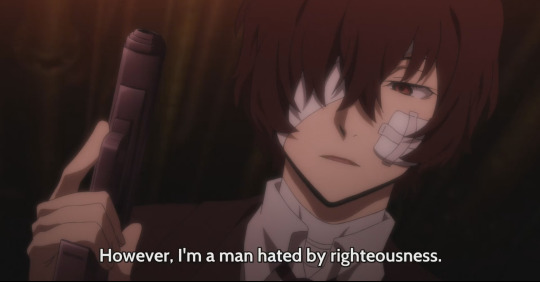
Yozo’s statement on “righteousness” parallels Dazai’s in Dark Era, but Dazai’s statement carries a slightly different sentiment. Rather than being indifferent to the likes of morality, Dazai says that he’s “hated” by the concept of morality.
I’ll be speculating a bit here → It’s heavily implied that Dazai had some sort of dark past that led him to joining the mafia, since he was already suicidal prior to doing so. This suggests that something affected his life so drastically to the point where he could no longer trust in such things as “righteousness,” because righteousness has wronged him in the past.

First, Yozo expresses his fear of people discovering his true nature under the mask of clownery, which would then lead to them pestering him for further inquiry. However, his real fear is that people would mistake his true nature as another part of his typical clownery.
More so than before, this attitude reminds me more of Dazai in the agency, rather than him in the mafia. Even though Dazai danced around darker topics in his conversations with Oda, he was still able to talk about them without much conflict. However, in the agency, Dazai doesn’t talk much about himself or any of his personal issues at all.
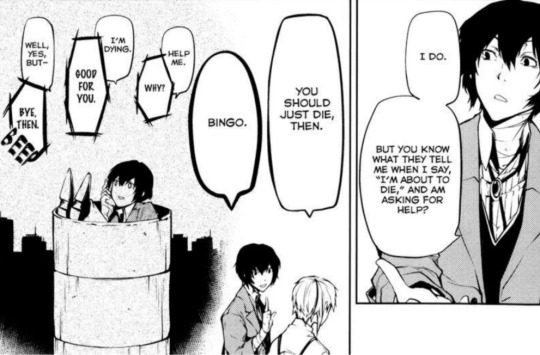
Although this scene has comedic overtones, it’s interesting to see that no one would help Dazai if he was actually dying. Still, it could be argued that the other agency members knew it was just Dazai’s regular antics. (or that Dazai wouldn’t die in the first place).
This scenario repeats itself another time when Dazai gets kidnapped by the mafia, and the other agency members kind of just brush it aside. As much as they may trust Dazai to take care of himself (which I’m sure he can do), it’s worrying that the other members may not be open to Dazai’s possible attempts at reaching out for help, if he were ever to make one.
In LN 4, 55 Minutes, Atsushi addresses this issue by asking Dazai why he wants to kill himself, but the answer is left open-ended, with Atsushi himself not remembering the answer (or if Dazai even did answer). You could interpret Dazai’s change from his time in the PM as an improvement of his mental state — which I have no doubt that has happened — but Dazai needs to face his issues head-on if he truly wanted to reconcile with his past.
“Perhaps someone should persistently tie Dazai up, open the lid over his chest and stuff the head of a vacuum cleaner in. They have to let Dazai, who should be screaming in pain and resisting, settle down. Following which, the difficult things in his heart must all be dragged out under the sun and stepped on mercilessly.“
— LN 2, Osamu Dazai and the Dark Era
Oda, the man who understood Dazai more than anyone else could at the time, even specifically stated that the pain in Dazai’s heart must be forcefully dragged out, because he knew that this would ultimately be the most beneficial for Dazai’s sanity.

Throughout No Longer Human, Yozo is often misunderstood by others, or other people simply don’t care about him.
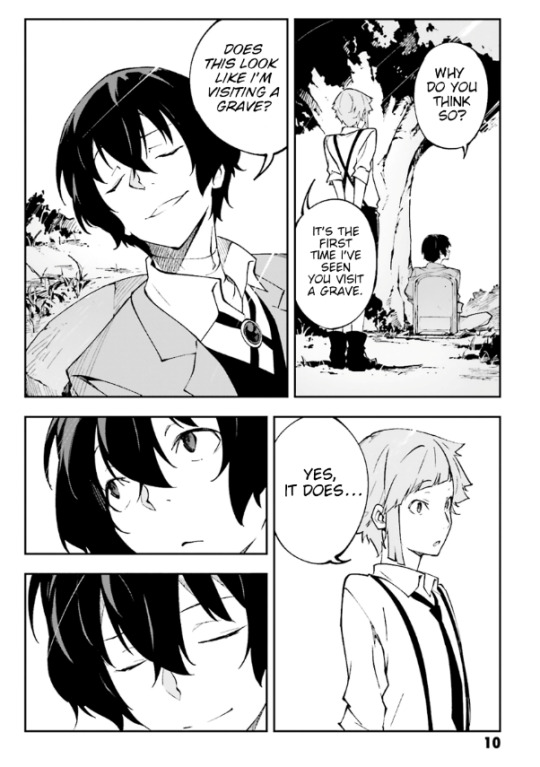
When Dazai goes to visit Oda’s grave in Dead Apple, Atsushi finds him and assumes that he’s visiting the grave of someone important to him, as an act of respect or remembrance, something of the sort. However, Dazai makes the automatic assumption that his “clownish words of deceit” (as stated by Yozo) will always be prioritized over the truth, which is why he chooses to brush off his actions as a joke.
Although I made the point earlier that the agency members don’t give Dazai opportunities to open up about himself, Atsushi is notably different, similarly to Oda, because he’s able to take Dazai seriously and persist even through his antics.
Atsushi takes Dazai’s act of visiting a grave seriously, even when Dazai plays it off, because he knows Dazai is a person just like anyone else. This understanding between them leads to Dazai telling Atsushi about Oda, thereby allowing Dazai to divulge a crucial part of his past.
Dazai and Yozo’s Friendships

Similarly to Yozo, Dazai’s attempt at “disentangling” himself from these relationships only serves to wear him out in the end. However, they also slightly differ in a way: Yozo is unable to form any friendships for his whole life, but Dazai had Oda. I would argue that Oda was Dazai’s only friend, mostly because of this quote:
“Odasaku understood him far beyond what Dazai had ever thought. He had already reached close to his heart, the place near the center of his heart. Before this, Dazai had never noticed there was someone who understood him so well.
For the first time in his life, Dazai wanted to know something from the depths of his heart.”
— LN 2, “Osamu Dazai and the Dark Era”
Oda was special to Dazai because Oda was able to understand him — maybe even more than Dazai could understand himself — which is why Oda is the only person that Dazai asks for advice from.
However, Dazai does the same thing as Yozo when he “plays the clown” as a form of self-protection from such valuable friendships. (which is probably preventing him from becoming closer to the rest of the agency).
“Things that we don’t want to lose will definitely be lost. Now that it has come to this, I have no more feelings anymore. Things worth pursuing will always disappear the moment before you get them. Nothing is worth prolonging a painful life to pursue.”
— LN 2, “Osamu Dazai and the Dark Era”
Interestingly enough, Dazai says this when Ango is revealed to be a spy — before Oda dies. If Dazai was in this state of distress from Ango’s betrayal, you could only imagine how devastating Oda’s death was.
Dazai speaks as if he’s speaking from experience, which suggests that he’s faced a similar loss in the past. Despite this implied experience, he still became friends with Oda (and Ango to an extent), fully knowing that it would only bring him pain in the end. Dazai's statement here acts more as a front that makes him sound cold and detached from the situation, only to hide how he truly feels about losing one of his only friends.

To give some context to this passage, Yozo’s partner, Yoshiko, had been sexually assaulted by a coworker, of which Yozo attributes the cause to her overly trusting nature. Thus, this leads to Yozo’s belief that trustfulness is inherently wrong or creates weakness.
Dazai’s hesitance to form friendships most likely stems from this same inability to trust others like Yozo, but Dazai does trust a few people, namely Chuuya, Oda, and Atsushi.
With Chuuya, there’s a different type of trust between him and Dazai. Their impeccable trust is obviously a key factor in their partnership as SKK, but there’s a certain limit with this trust. They certainly trust each other in battle, but I’d argue that this trust doesn’t extend to their personal business.
As of now, we don’t know a lot about how SKK interacted with each other during their time in the mafia (which could change with the new LN), but I doubt PM Dazai would feel comfortable with confiding in Chuuya with anything because they (kind of) hated each other. The level of trust required for a friendship would involve a mutual understanding between two people, but Chuuya and Dazai haven’t necessarily shown us that they were able to do that.
Dazai essentially broke his trust with Chuuya by leaving the mafia on a whim, but he also intentionally antagonized himself to try to make Chuuya hate him.
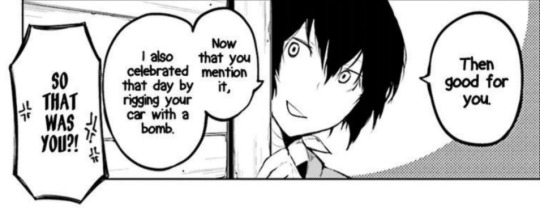
This scene also has comedic overtones, but it suggests something a bit sadder about Dazai. There are possibly two motivations as to why Dazai chose to do this: (or a mix of the two)
1. Dazai didn’t want Chuuya to be incriminated as his accomplice when he became an enemy of the mafia.
2. Dazai wanted to push Chuuya away because Oda — Dazai’s most trusted friend — had just died. As a form of self-protection, Dazai broke whatever semblance of friendship he shared with Chuuya in order to prevent the same pain that came with Oda’s death.
It’s also important to consider that trust is a 2-way street; both parties have to have the same level of trust in each other. Just like Yozo, if Dazai is unable to trust anyone, then he may have cut Chuuya off to protect him (since Chuuya may have trusted Dazai more than Dazai was able to reciprocate).
In contrast, Oda and Dazai have a level of unspoken trust that basically motivates Dazai to change his entire life.
“Odasaku’s eyes radiate with conviction. The words are clearly said with some sort of strong basis. Is it past experience? Or perhaps someone’s suggestion? — He is trying to show Dazai the path he once walked. Dazai understands this. Dazai can trust it.“
— LN 2, “Osamu Dazai and the Dark Era”
Returning to Yozo’s question — “Is trustfulness a sin?” — Dazai answers it by showing us the strength of trust in this moment. Trust insinuates blind faith in another person, the willingness to believe someone else without logical reasoning, which makes it all the more important when PM Dazai — the genius prodigy who operates on a solely logical basis — is able to trust Oda and change his path in life.
Atsushi is most likely the one that Dazai trusts the most in the agency, due to the aforementioned issues with the other members. However, it seems more like a budding trust that’s growing to become like Oda and Dazai, but it still requires Dazai to take that step forward to further their trust.
Dazai and Yozo’s View of the World

In this scene, Yozo had made a decision for immediate gratification, but that choice caused him insufferable pain afterwards — supporting his belief that the world was a “place of bottomless horror.”
This parallels two of Dazai’s statements: one from Dark Era and one from Dead Apple.
“Please, take me with you. Wake me up from this rotten world of a dream. Come on, come on, come on!”
— LN 2, “Osamu Dazai and the Dark Era”
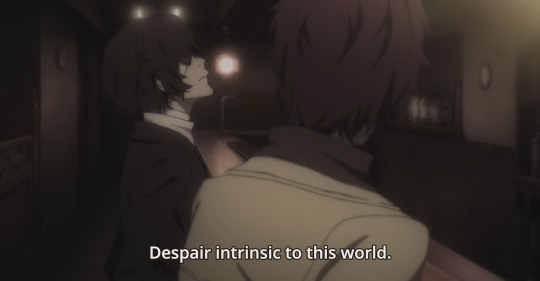
(Dazai wasn’t talking about himself here, but the allusion sets up a situation where he can talk about himself indirectly — I talk about it more in my other post here)
We don’t really get a reason for why Dazai is suicidal, but from this we can infer that it’s something more complex than he makes it out to be — something like an issue deeply rooted within the world, with no easy solution.
One could guess that this was the result of an unfortunate decision (like Yozo), or the realization that the world was simply a terrible place (possibly because no one cared for him as a kid and he had Mori as a “parental” figure instead).

Yozo expresses his lack of understanding in the compassion of human nature, but Dazai (as we know) seems to understand other people perfectly, as least enough to manipulate them.
However, this forms somewhat of a paradox: Dazai understands people so well to the point that he can’t understand them.
Dazai understands every flawed aspect of a human being — the tendency to manipulate, lie, kill, etc. — most likely because of his past as a young child. “Human beings never did teach” him the hopeful aspect of human nature — the ability to love and cherish others.
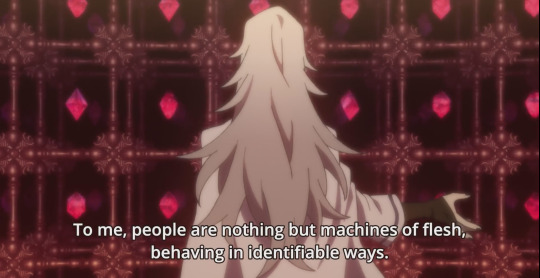
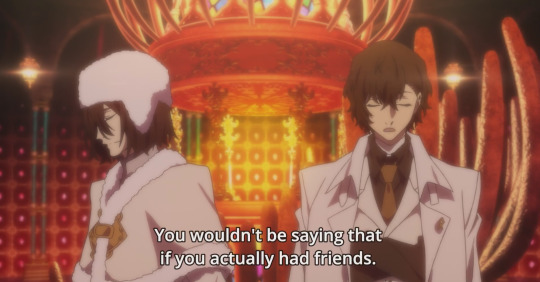
Shibusawa in Dead Apple reflects this mindset, but take note of what Dazai says: “You wouldn’t be saying that if you actually had friends” — clearly a reflection of Dazai’s personal experience, by knowing how important friends are.

Yozo’s deathly fear of society tames itself when he comes to the realization that society is really just made up of a bunch of individuals working for their individual benefit, so he has no reason to fear society as a whole.
I don’t believe Dazai has this same fear of society, but he does reflect this individualistic mindset in the way he acts. Often enough, Dazai doesn’t tell anyone about his plans and would rather manipulate people into following such plans, even when it would be easier to cooperate. He always takes care of conflicts by himself, and by his standard.
Yozo’s fear of society possibly manifested into Dazai’s ostracization from society. More speculation here, but → My guess is that Dazai was alienated not only as a genius isolated for his intelligence, but also for his ability. There seems to be some division between regular society and ability-users’ society, but I can see Dazai being rejected by both because he’s the antithesis to all abilities.
Regular society would either shun him like other users or attempt to exploit him for their personal gain (possibly for his intelligence AND his ability), or ability-users would see him as a threat and/or menace to their safety.

When Yozo considers a double suicide with his partner, he comes to this unsure conclusion of whether or not he actually wants to go through with it.
This reflects what Oda believes about Dazai:
“I thought you and Dazai were very similar, unable to see the value of your life, hoping for death, hence jumping into a world of violence and fighting. But that’s not the case. That guy is just a child who’s too smart. Just a crying child who’s been left alone in the darkness, a world of nothingness far emptier than the world we can see.“
— LN 2, “Osamu Dazai and the Dark Era”
At the end of the story, Gide and Oda are different from Dazai because they face an inevitable hopelessness. However, Dazai has a small spark of hope to live on that persists beyond the other two.
This is represented in Dazai’s own statement to Oda, when Oda is set on walking to his death: “Go and rely on something, hope for something good to happen next, that something will definitely happen.”
If anything, this sounds more like a plea to himself than to Oda, but it establishes an important point: hope is built upon the assumption that the future will treat your present desires well. Vice versa, hopelessness is built upon the expectation that the future will neglect your present desires.
It’s a bit wordy, so I’ll elaborate on. Right after Dazai says this line, they proceed to talk about their desires → Dazai wants to find a reason to live, so he joined the mafia; Oda wanted to become a novelist, so he didn’t kill anyone.
Now, the difference between hope and hopelessness:
Oda feels hopeless because he expects that his present desire (to become a novelist) won’t be fulfilled in the future. By losing the one qualification that he felt he had to follow (not killing anyone), he no longer believes that he can become a novelist.
Dazai has hope because he assumes that his present desire (to find a reason to live) will be fulfilled in the future. He doesn’t know that for sure, but he persists onwards regardless of having full assurance or not.
Dazai’s hope and trust in Oda brings him to where he is in the present, and takes him one step closer towards discovering his reason to live.
#bsd#bungou stray dogs#bsd meta#bsd analysis#bsd dazai#dazai analysis#no longer human#bsd oda#surprisingly more oda than i expected#very ramble-y i apologize in advance
322 notes
·
View notes
Text
Alistair & Celia Headcanon Collection
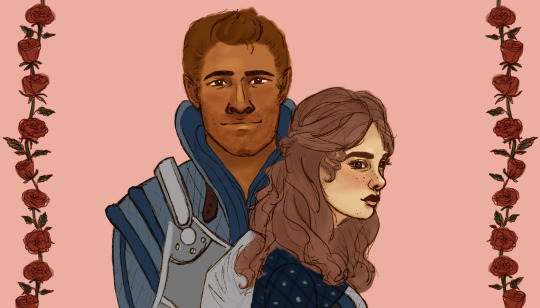
Some Amell x Alistair (largely fluff) headcanons! Includes some from Origins, Warden time at Amaranthine and the Inquisition-era. Some of these I have had since my first playthrough, but others I may have read elsewhere, loved and thusly absorbed so please let me know if I can link anyone!
Origins
The first time they meet at Ostagar, Celia thinks Alistair is the most fascinating person she has ever encountered because no one in the Circle had a particularly boisterous sense of humour. Alistair is oblivious to her heart eyes, and also holds back because he’s worried she won’t survive the Joining.
Even after the Joining, Alistair tries very hard not to ~feel feelings~ despite the clear signals Celia is hurling at him because he assumes she won’t like him once she gets to know him more/she will get bored of him/ she will leave like everyone else i.e. the boy is hecking damaged.
Celia laughs obnoxiously hard at all Alistair’s jokes because a) she finds them unexpected, and b) because, like a dork, she wants to prove she gets the punch line. Alistair is perplexed by her reactions at first, and cautiously wonders if she is mocking him. Once he realises she is genuinely amused, it bolsters his ego significantly.
Celia has no concept of personal space and sits and walks very close to everyone. There wasn’t a lot of room at the Circle so she forgets she can spread out. Morrigan makes it clear she needs to back off (Celia doesn’t need telling twice) but Alistair is more relaxed and gets used to it quickly after the confusion of the first night when she blithely sets up her bedroll right next to his. Alistair assumes she is a bit scared of sleeping in the forest but really she is just accustomed to the need to cram as many apprentice bunks into a room as possible.
In a way, Alistair is also used to sharing small spaces (Chantry and Wardens) so it doesn’t bother him at all when Celia chooses to sit pressed against his side, walks so their arms bump together, or unconsciously brushes an eyelash from his cheek. He quickly grows to like her overfamiliarity (for some reason…).
Similarly, Alistair eats Celia’s leftover food if she can’t finish it or doesn’t like it, even before they’re a couple. She just offers one day and after that it becomes a given. The others side-eye them but they are happily oblivious.
Celia gets in trouble from the rest of the party for getting distracted yelling encouragement and cheering Alistair during combat. In turn, Alistair gets in trouble for turning around mid-battle to thank her when she buffs or heals him. Morrigan advises that if they are both so determined to get killed, she is more than happy to assist with hastening the process.
Celia’s mabari, Trevor, is quickly accepting of Alistair and his proximity to Celia because he observes Alistair protecting Celia in battle and thusly deems him to be a ‘good dog’ and considers that they are equals in the pack.
Alistair and Celia vandalise each other’s wanted posters whenever they come across them. It gets competitive.
Celia doesn’t really want to be in charge of saving the world but has three things working in her favour: 1) she absolutely hates letting people down 2) has an intense need to finish what she starts 3) she is in possession of a bossy streak.
That said she spends the entire Blight screaming internally to an extent not even Alistair fully grasps.
They go to the Circle Tower first, because Celia thinks she will have the best chance of getting help from people she knows and is also ‘homesick’ in the sense that she is very glad to be free of the place, but stressed enough with everything going on to crave something familiar even if she resents it. The events there devastate her. Along with the loss of friends and mentors she has known since childhood, being trapped by herself in the fade particularly terrifies her as she has never truly been alone for so long before in her life. It reminds her of the Harowing which totally blindsided her. She is very teary, untalkative and introspective for some time afterwards, but both Trevor and Alistair have the correct instinct to stay close without trying to interact with her which she finds incredibly comforting.
Accustomed to making potions, Celia will not under any circumstances deviate from a recipe while cooking, whereas Alistair just chucks everything in to use up leftovers and see what happens. Alistair gets meals together super quickly whereas Celia takes forever. A little unfairly, Celia is perceived as the better cook because she produces very consistent meals, while Alistair’s experiments sometimes do work, and sometimes don’t, with people tending to focus on the disasters rather than the successes. Meanwhile Celia is rather: “should I add half a sprig of rosemary? No I mustn’t: it would be far too daring!” so everyone learns to tip their own seasonings into their bowl before even tasting her food.
When they’re travelling and walking for days on end, Alistair and Celia make up a lot of games in the vein of ‘I spy’ and ‘would you rather?’ They can occasionally persuade others to participate though no one enjoys them or gets quite as invested as Celia and Alistair (who are actual children).
A game stops abruptly one day when Celia guilelessly asks if Alistair would rather be Emperor of Orlais or King of Fereldan and he gets extremely defensive and answers, “Neither.” Having no context for this reaction (yet), Celia (a stickler for the rules) pushes him, insisting his answer isn’t allowed and that he’s cheating until Alistair gets grouchy, stomps off and refuses to play anything for days.
Celia figures he must be overtired, but his unhappy reaction does come back to her later at the Landsmeet and contributes to her already firm resolve not to put him on the throne.
When bored, Alistair also periodically asks Celia to, “Do a trick!” with her magic and she usually obliges with something small and silly which Wynne always scolds them for (but they continue to do anyway).
Celia does not like Eamon one bit and makes it clear from their first meeting. Alistair actually gets a bit annoyed at her because she is polite to 99% of the other people they meet and he can’t understand what her problem is. Celia won’t say because she doesn’t want to drive Alistair away so she remains coldly civil towards Eamon and commences a long, looong process of nudging Alistair towards having the realisation himself that a) Eamon is manipulative, selfish and cruel and b) Alistair deserves better.
Celia wants to collect some of the books they find which is not practical given they are constantly travelling, but Alistair carries as many as he can in his pack and suffers in silence for it, ultimately finding it worth it for her enthusiastic gratitude.
Celia cuts Alistair’s hair and does a very respectable job after weeks of him complaining it’s flopping in his eyes (they used to cut each other’s hair in the Circle). Zevran pretends she did an awful job, gasping in horror at Alistair’s appearance, much to Celia’s ire. Alistair (internally weeping) tries to be brave until he can check his reflection in some plate mail and see it is fine.
Celia is very naïve about how the ‘real world’ works having been at the Circle since she was a child. This is especially evident in Denerim and Alistair has to explain how money works and grab her before she wanders down dicey looking alleyways.
Alistair nearly dissolves into a paroxysm of agony when he points out his favourite type of cheese at the Denerim Markets and (accustomed to the very limited range of bland foods provided at the Circle) Celia innocently asks, “There is more than one type of cheese?” Alistair makes it his mission to educate her. She doesn’t like most of what he feeds her but doesn’t say so to protect his feelings given he seems to take the matter so incredibly personally.
Leliana convinces Celia to sing one evening at the campfire. She’s breathy with a very limited range but manages okay, and Leliana plays and harmonises in support. Watching on with a goofy smile plastered over his face, Alistair comments to the surrounding companions about how talented she is and they’re like “…she’s really not mate.”
When they both wake up from a blightmare (or Celia has one and wakes Alistair with her flailing) they sneak about and eat anything they can find then sit up and have massive deep & meaningfuls (i.e. in the spirit of going for a long drive with a friend or being in the garden with someone outside a party and spilling your guts). Eventually they start blaming the depleted food stores on Leliana’s nug, Schmooples, much to Leliana’s displeasure.
Given Celia usually responds so well to his jokes, Alistair gets a bit peeved when Celia starts replying to some of his more severely self-deprecating humour with an unamused, “No you’re not,” or, “That’s not true.” He defensively argues it’s just a joke, but he does stop doing it so much as time goes on.
Celia is SO excited when Alistair gives her the rose. She never in her life thought she would be the recipient of a proper ~romantic gesture~…however she accidentally sits on the rose about five minutes after she gets it. Celia is devastated. There is a lot of panic and tears and she keeps one petal pressed in a book but has to unceremoniously ditch the rest in secret.
Celia doesn’t tell Alistair about this until years later and she’s terrified he’ll be hurt but he just laughs because he was so worried he was going to be the one to squash it and then she destroyed it basically the minute she got it. Alistair acknowledges it was an impractical gift given their situation. Celia gets mad and says it was a PERFECT gift and is annoyed at how funny he finds it given this has been a crushing, guilty secret hanging over her for years.
Following this, every time Alistair gives her any kind of gift, he can’t help but throw in a ‘Don’t sit on it!” and cracks himself up, especially when Celia gets grumpy about it and accuses him of spoiling the moment. It happens so often that when Alistair chooses a horse for her and plans to teach her to ride, Celia manages to cut him off with, “Yes, I know Alistair: I can sit on this one,” and steals his thunder.
Alistair periodically says Celia’s name just to check if she’ll answer, especially after a long period of quiet or to see if she’s awake à la screaming in the chantry because it’s so silent. When she responds he says, “Nothing” or “Never mind” but he finds it vaguely comforting just to hear her reply and it’s a habit he never loses, even when they have been together for years and he is much less isolated generally. Alistair doesn’t realise he’s doing it, and it never happens frequently enough for Celia to notice: she just assumes he has lost his train of thought.
They sometimes conspire to purposely fall to the back of the group while on the road so that they can hold hands. Everyone knows full well what they are doing, but Alistair and Celia think they are being incredibly ~sneaky~.
The first time they sleep together they laugh. A lot. Before, during and after.
Alistair snores loudly but only when he’s on his back. Celia is used to the noise of people sleeping around her at the Circle so it doesn’t bother her and she doesn’t want to disturb him because she knows he needs the rest.
When they are known to be sharing a tent however, their companions will slap on the walls of it and demand she kick him until he stops snoring. Celia will relent and gently prod and nudge Alistair until he rolls over with a bit of sleepy grumbling.
I think everyone has this headcanon to the point it is basically actual canon HOWEVER I am legally obligated to include it: Alistair is a professional body heat distributor and Celia drastically cuts down on the number of blankets she uses once they are sleeping together. If she stands in front of him on cold days, he understands the non-verbal signal and will automatically wrap her in his cloak.
Also might as well be canon: Alistair likes to be the little spoon. He doesn’t say, but Celia knows.
Decidedly not a fluff one (you can skip to Amaranthine to avoid) but the ritual with Morrigan fairly significantly messes Alistair up (both the act itself and his consideration of the repercussions i.e. Kieran). He’s jubilant and relieved at their victory over the Archdemon, but in the background struggles to process and there is some fallout once the victory celebrations lull and he has time to fully register what happened. Alistair grapples with a lot of guilt, disgust and confusion. He doesn’t know how to express it or where to direct his emotions so it mainly manifests as self-loathing. He wants to talk to Celia about it but can’t articulate his feelings which makes him feel worse.
Celia tries to comfort him, but he needs space on and off for a long while after and she gives him it. She feels a lot of guilt too, and never stops wondering how much it was actually his choice to do the ritual, worrying that she made him feel like he had to do it. Eventually they discuss it openly and honestly, which eases both of their minds somewhat, but it takes a long time to get to a point where they can talk on the subject. Meeting Kieran at Skyhold also helps Alistair down the line, though it’s obviously painful.
Amaranthine & Inquisition
Alistair keeps an eye out for people struggling, especially new recruits who are having trouble fitting in. He takes them under his wing and is very good at building people up and making sure everyone is included. He’ll just start enthusiastically greeting people like they are his best friend and squeezing himself onto the bench next to them at meals until everyone else follows suit.
For recruits that don’t respond well to his ‘mother hen’ type attention, Celia is good at assigning tasks that specifically highlight their strengths and builds their confidence/sense of purpose which also gains them the respect of their peers.
Alistair has been known to stand behind Celia while she is giving mundane orders/making speeches and pull faces or impersonate her, turning stony and impassive when she spins around accusingly because people are laughing.
But if anyone else talks smack about her he gets very, “Sorry mate, just to clarify was that comment directed at my wife, your Commander, the hERO OF FERELDAN, VANQUISHER OF AN ARCHDEMON!? That’s lucky, I didn’t THINK IT LIKELY. Because that wouldn’t be WISE, would it now?” etc. with some loud, fake laughter and firm backslapping for the worst offenders.
The plan for them to part ways so that Celia can search for a cure goes very badly, especially because Celia (under a lot of stress and not coping™) eventually devolves into, “I’m in charge and I say so,” which is a big betrayal of their agreements both to stay together, and make decisions together on equal footing. She realises this and takes it back but Alistair is demoralised and gives in with a bit of petty, sarcastic reverence e.g. saluting and, “Whatever you say boss, don’t know why I dared to utter an opinion how foolish of me...” so they still part on slightly strained terms, even after later mutually apologising and trying to make the most of their time together before they go.
Both regret the argument during their separation and write horribly soppy letters to each other, but something still feels uncomfortably unresolved until they are together again. They pine. So much. It’s disgusting and cliched. There is considerable sighing and staring at the moon or deep into tankards, very much to the ire of those around them. Alistair can be particularly annoying: “This roll reminds me of my wife...she eats bread sometimes...”
After Celia sends the letter to the Inquisitor, she writes to Leliana directly along the lines of, “I know it was incredibly subtle but I wanted to check: did they get the message? That I will destroy them if Alistair gets hurt?” and Leliana replies in the vein of, “Hon, it wasn’t even remotely subtle ffs…”
When reunited, though ecstatic and nearly delirious with joy and relief, it takes a while to rebuild the trust they once had, especially for Alistair. There’s an unfamiliar awkwardness that flares up unexpectedly, but it doesn’t last and they’re both fully committed to each other and to staying together permanently this time.
Celia and Alistair have a conversation recapping everything that happened while they were apart in which Celia is all, “Poor Hawke. Honestly I’m shocked you didn’t do something obscenely idiotic like try and sacrifice yourself thank the Maker for that…” and Alistair is there, nervously sweating, looking for an exit, loosening his collar etc.
As they settle back into their old routines Alistair will occasionally blurt out things like, “I really like having breakfast with you,” and then berate himself internally for how trite that sounds but Celia replies on cue, “I love waking up next to you and the way you groan when you stretch your back out and the way you check your hair twice before you leave the room and the way you complain if I don’t eat my crusts and the way you still hold my hand when we’re walking...” and basically they’re just blissfully happy being comfortably domestic and even as they get older they are forever just teenagers in love.
The Wardens at Amaranthine acquire/receive a griffon egg and the hatchling imprints on Alistair and decides he is their mother. It can’t cope with separation, crying constantly if Alistair goes out of sight, and won’t let anyone else feed or handle it so Alistair carries them in a sling 24/7. He gets to give orders and run training sessions with the tiny griffon occasionally poking its head out just to glare at everyone.
Whenever the baby griffon squeaks, Alistair automatically replies, “Well said,” or “Excellent point, Ser Beaksly” with a totally straight face.
For the first few months, Celia gets nipped or scratched if she approaches Alistair unless he wraps the griffon up. It so badly wants to fight her. Celia is permitted to sleep in her own bed, as long as the griffon sleeps curled on Alistair’s chest and Celia doesn't try anything outrageous like touching her husband even fleetingly. It gets a little frustrating as the months drag on, but the image of Alistair with the sling over his armour, or with the griffon snuggling possessively around his neck staring daggers at everyone, is so entertaining that Celia can’t get truly annoyed about it. As the griffon gets older it does learn to tolerate other people and becomes more independent but remains very protective of Alistair and favours him above all others. Insert the ‘Ah yes. Me. My husband. And his thousand pound murder-bird-cat child’ meme here.
Modern AU Bonus Round
They share headphones while commuting.
They occasionally end up wearing sort of matching outfits, mostly unintentionally.
They consistently refer to their dog, Trevor, as their son to the point that people who aren’t familiar with them assume that they actually have a child.
#dragon age#dragon age origins#alistair theirin#warden alistair#warden x alistair#amell x alistair#warden amell#headcanons#my art#my writing#file under no one cares but me#but my goodness do I ever care#I can't wait to delete a bunch of these from my phone where they have been lurking forever#this draft is weeks old why am I so scared of posting on tumblr???#the problem is the longer I leave it#the more I add#I'm out of control#this is too many headcanons#I must be stopped
39 notes
·
View notes
Text
“...In early portraits Livia sports the nodus hairstyle, in which the hair rolls forward over the forehead and is then drawn back to form a distinctive topknot. This style was seen by Ovid as a useful corrective to a very round face. Generally in the heads of this group the face is a regular oval with broad cheekbones. The eyes are large and the brow above them arches slightly. The nose is large and aquiline, while the curving mouth and the chin are very small. The portraits project an image well suited to Livia—one of ageless and elegant beauty, calm and dignified, perhaps strangely emotionless.
The severity of the nodus style would be less appealing with age. Thus the hair in portraits of the Tiberian period generally has a centre parting, and falls from either side in waves. The head is still relatively youthful, given that Livia must have been now in her seventies, a tradition maintained by modern aging monarchs, whose images on stamps and coins tend to be frozen for several decades. It could be argued that the elusive issue of Livia’s appearance is irrelevant in a political biography. But it has some historical importance. The sources suggest that Augustus was drawn to Livia initially by basic sexual attraction. Some knowledge of her physical appearance would help us place that claim in a proper context.
Whatever attributes Livia was granted by Nature she could enhance by Art. When it came to dress, Ovid attributes to Livia a surprisingly progressive attitude, that she was simply too busy to spend a lot of time on her appearance. The assertion has to be seen against the background of a large household and an enormous staff, whose task it would have been to pay attention to those details deemed unworthy of their mistress’s time and effort. The evidence for the wide range of functionaries operating within the household of Livia is dealt with in chapter 9.
At this point we can limit ourselves to noting the surprising number of helpers devoted to Livia’s personal appearance. Inevitably there were several ornatrices (dressers), as well as staff a veste/ad vestem, whose task it was to keep her clothes in good order. In addition, the ab ornamentis would have had responsibility for her ceremonial garments and accessories, along with a specialist who looked after those she wore as priestess of Augustus, a freedman ab ornamentis sacerdotalibus. Her calciator made her shoes. Augustus liked to boast that his clothes were made by his wife and sister. Perhaps, but they would have had help. Livia employed both lanipendi (wool weighers) and sarcinatores / sarcinatrices (sewing men / women). For her comfort she had an unctrix (masseuse).
Perhaps most striking are the skilled craftsmen who would have been employed for the manufacture and maintenance of luxury items. Her aurifex (goldsmith) and inaurator (gilder) might have been occupied mainly with furniture, but the margaritarius (pearl setter) sounds like someone who would have been employed to work on her personal jewellery. Elizabeth Bartman has noted the absence of jewellery from the sculpted images of Livia, which she describes as ‘‘bordering on the ascetic.’’ This, of course, may have been a deliberate fabrication of Livia’s image in the sculptural prototypes that she allowed to be distributed. There was a tradition of Roman women making a sacrifice of luxury items for the good of the state, such as the women who donated their jewellery to help fund the war against Veii in the early republic.
But it may be that Livia aimed for understated elegance, to be simplex munditiis, as Horace expressed the concept in his famous poem. This could explain why Augustus aroused amused disbelief among the senators when he held up Livia as an example of womanhood and, when pressed to explain, cited as evidence her appearance and dress and her exodoi (her public forays) as illustrations of moderation to be emulated. Augustus had the evidence of his own eyes, and he admired her for avoiding extravagance. But the senators perhaps may have seen a kind of elegant moderatio, the appearance of simplicity that only the best dressmakers, coiffeurs, and jewellers can produce, using the finest and most expensive material.
Livia’s energies would have been channelled mainly into her role as wife of Augustus and as mother of Tiberius. We know little of her private interests, or of how she tried to relax. Only one scrap of evidence survives for anything remotely approaching frivolity. She seems to have competed inanely with Julia, the granddaughter of Augustus, over the record for owning the smallest dwarf. This was settled honourably, as Julia owned the smallest male, at two feet, one palm (about sixty-seven centimetres), but Livia could boast the smallest female dwarf, Andromeda, height not recorded. We might also detect perhaps a hint of a certain silliness when she was a young woman.
The story of her trying to foretell her child’s sex by means of a hen’s egg is noted in chapter 1. After Tiberius’ birth she seems to have consulted an astrologer (mathematicus), Scribonius. He was able to forecast that her son would govern, but without the trappings of monarchical rule, an especially impressive performance, because he anticipated this before the principate had been established and before Livia had even met Augustus. But this kind of behaviour should be viewed in the context of its age, and Livia was probably no more unsophisticated in such matters than the great mass of her contemporaries.
Otherwise her interests are likely to have been more serious, and she seems to have been a literate and educated woman. At any rate, in one of his letters to her Augustus quotes frequently and extensively in Greek, presumably on the assumption that she would understand him. She did of course spend some time in the Greek world during the period of her first husband’s exile, but she would at that time have moved mainly in a Latin-speaking milieu. It is more than likely that she learned the language through formal tuition. Given her family background, we can assume that Livia would have been well educated as a child. Roman girls shared domestic tutors with their brothers before their marriage. There are many examples of the happy result of this practice. Pliny the Younger was flattered to find his young wife reading and memorizing his works, and setting his verses to music. Cornelia, the wife of Pompey, was educated in literature, music, and geometry, and enjoyed attending philosophical discussions.
The existence of the highly educated woman, at least at a slightly later date, is confirmed by the caustic observations of the atrabilious Juvenal, who proclaims horror at females who speak with authority on literature, discuss ethical issues, quote lines of verse the rest of humanity has not even heard of, and even correct your mistakes of grammar. Apart from Livia’s knowledge of Greek, however, we have no concrete evidence of her intellectual pursuits, in contrast to her great-granddaughter Agrippina, whose memoirs survived and were read by Tacitus. But we do have some testimony about Livia’s intellectual sophistication. Philo was a contemporary and, though a resident of Alexandria, very familiar with Rome and the imperial house.
For example, he met Caligula in person when he headed a delegation to Rome to represent the case of the Jews of his native town. In a speech that he attributes to Caligula’s Jewish friend Herod Agrippa, he has Agrippa cite the precedent of Livia, whom he represents as a woman of great mental ability and untypical of her sex, for he contended that women were generally incapable of grasping mental concepts (whether this is Agrippa’s or Philo’s prejudice is not made clear). Agrippa supposedly attributed Livia’s superiority in this sphere to her natural talents and to her education (paideia). Livia was well disposed to the Jews and generous to the Temple, and we might expect some gilding of the lily. But Philo’s characterization of her could clearly not have been absurdly wide of the mark, or the arguments attributed to Agrippa would have been discredited.
The Corinthian poet Honestus describes Livia as fit company for the muses, a woman who saved the world by her wisdom. The inflated language traditional in such a dedicatory piece, however, means that it has little historical value. Apart from the uncertain case of Honestus, we have no other case of Livia’s supporting any cultural or intellectual endeavour, although she was an active patron in many other areas. In this sphere she was eclipsed by Augustus’ sister Octavia, who was a sponsor of the architect Vitruvius and to whom the Stoic philosopher Athenodorus of Tarsus dedicated a book of his work. Although Livia’s interest in fostering artistic and cultural undertakings might have been limited, there was one field in which her enthusiasm seems to have been boundless: the issue of healthy living, both physical and psychological. Despite her general reserve in most other matters, she seems to have been willing, even eager, to impart her views on the issue of how to live a long and robust life.
She was ahead of her time in her use of what would now be called a grief counsellor. When her son Drusus died in 9 bc, she was devastated. That she managed to handle the situation with dignity was due to no small extent to the counselling given her by the philosopher Areus (or Areius) Didymus of Alexandria. Areus was basically a Stoic but kept an open mind to other schools and ideas, the kind of eclectic pragmatist that the Romans found appealing. He was clearly a man of great charm, and at the time of Actium, Octavian described him as his mentor and companion. Octavian reputedly spared all the Alexandrians after the battle and stated publicly that he did so because of the fame of Alexander the Great, the beauty of the city, and his regard for one of its citizens, Areus. In the event Alexandria did not emerge totally unscathed, for Octavian followed up his generous gesture by visiting the corpse of Alexander, where he behaved like the worst kind of bad tourist, touching the nose and breaking it off.
According to Seneca’s account, to which the author undoubtedly added his own imaginative touches, Areus, in giving his advice to Livia, described himself as an assiduus comes (constant companion) of her husband and claimed to know not only their public pronouncements but also the secretiores animorum vestrorum motus (the deeper emotions of the two of you). He clearly knew his patient well, and in the event proved a highly effective consultant. He gently observed that Livia had been in the habit of repressing her feelings and of being constantly on guard in public. He encouraged her to open up when dealing with the subject of Drusus, to speak to her friends about the death of her son, and to listen to others when they praised him. She should also dwell on the positive side of things, particularly the happiness that he brought her when he was still alive. The advice may have the shallow ring of the popular psychology handed out in the modern media, but it worked.
Seneca observed how well Livia coped with her loss by following this advice, in contrast to the morbidly obsessive Octavia, sister of Augustus, who never ceased to be preoccupied with thoughts of her dead son Marcellus. Livia lived a long and, by her own description, healthy life, with only one serious illness recorded, when she was already eighty. Her formula for her robust constitution seems to have been proper diet and the use of ‘‘natural’’ remedies. She clearly had the irritating habit of healthy people who insist on inflicting on others their philosophy of wholesome living. For history this has proved fortunate, because some of her dietary recommendations are recorded. In her early eighties she anticipated a trend that was to reemerge almost two thousand years later, attributing her vigorous condition to her daily tipple. She drank exclusively the wine of Pucinum. This was a very select vintage, grown on a stony hill in the Gulf of Trieste, not far from the source of the Timavo, where the sea breezes ripen enough grapes to fill a few amphorae. Pliny confirms its medicinal value, which he suspects might long have been recognised, even by the Greeks.
It need not be thought that in following this regimen Livia had simply invented a formula for healthy living. In fact, she was echoing a nostrum that had become very trendy in her youth, and in doing so marked herself as an acolyte of one of the master-gurus of health-faddists, Asclepiades of Prousias. According to tradition, Asclepiades started as a poor professor of rhetoric before turning to medicine. During his career he acquired considerable fame (Pliny speaks of his summa fama) and provoked the animosity of other medical writers—he was still being attacked by Galen almost three hundred years after his death. The anger of his fellow healers is not hard to explain, because he turned ancient medicine on its head by distancing himself from dangerous pharmacological and surgical procedures, even describing traditional medicine as a ‘‘preparation for death.’’ Instead, he placed emphasis on more humane and agreeable treatments—diet, passive exercise, massages, bathing, even rocking beds. Pliny felt that he mainly used guesswork but was successful because he had a smooth patter.
How effective he was cannot be gauged now. He is said to have recovered a ‘‘corpse’’ from a funeral procession and then to have successfully treated it. But famous doctors in antiquity routinely restored the dead to life. Perhaps more impressive, and more alarming to the medical profession, was Asclepiades’ pledge that by following his own prescriptions he could guarantee that he would never be ill, and that if he lapsed, he would retire from medicine. He was apparently never put to the test, and eventually died by accident, falling from a ladder. It is not hard to believe that Asclepiades might have exercised an influence on Livia, especially in that Pliny remarks that he almost brought the whole human race round to his point of view, and Elizabeth Rawson argues that a case can be made that he was the most influential Greek thinker at work in Rome in the first century bc. Pliny notes a dilemma that has a strangely contemporary ring—whether wine is more harmful or helpful to the health.
As the champion of the latter belief Pliny cites Asclepiades, who wrote a book on wine’s benefits, based to some extent on the teaching of Cleophantus. Asclepiades received a familiar nickname oinodotes (wine giver), although to avoid being cast as someone who encouraged inebriation, he did advocate abstinence under certain circumstances. As Pliny words it, Asclepiades stated that the benefits of wine were not surpassed by the power of the gods, and the historian, like Livia, seems to have been won over, conceding that wine drunk in moderation benefitted the sinews and stomach, and made one happy, and could even be usefully applied to sores. Livia might have become acquainted with Asclepiades’ teaching while he was still alive (it is uncertain when he died), but in any case Pliny makes it clear that after his death his ideas took a firm hold on the population, and would still have been in circulation for many years after he made his ultimate precipitous descent from the ladder.
Apart from her views on the benefits of fine wines, Livia was known for other health tips. Pliny adds his personal recommendation for one of her fads, a daily dose of inula (elecampane). The elecampane, with its broad yellow petals, is a common plant throughout Europe, and its root has long been a popular medicine. Because it is bitter and can cause stomach upset if eaten alone, it is usually ground up, or marinated in vinegar and water, then mixed with fruit or honey. It was supposedly useful for weak digestion. Horace describes its popularity among gluttons, who could overdo safely by using elecampane afterwards. Then, as now, celebrity endorsements helped; Pliny observes that the use of the plant was given a considerable boost by Livia’s recommendation. In some modern quarters it is still promoted as an effective tonic and laxative.
…These curiosities do provide a possible context for one of the charges levelled against Livia, which the scholarly world generally agrees was groundless: that of using poison to remove those who blocked her ambitions. The accusation is one that powerful women in competitive political situations throughout antiquity and the middle ages found difficult to refute, because poison has traditionally been considered the woman’s weapon of choice. Because women took the primary responsibility for family well-being, they would have been the inevitable targets of suspicion if a person died of something brought on by gastric problems. If Livia had insisted on inflicting her home cures on members of her family, it is not difficult to imagine that a malign reputation could have arisen after a death that was advantageous to her. One also should not discount the possibility that the combination of birthwort and ash of swallows did more harm than good, and that she might indeed have helped despatch some of her patients, despite the very best of intentions.
Allied to Livia’s preoccupation with herbal remedies is her passionate interest and regular involvement in various aspects of horticulture. The most vivid illustration of this comes from her villa at Primaporta . The highlight of the complex is the garden room, built and decorated around 20 bc in the form of a partially subterranean chamber nearly 12 metres long by 6 metres wide, perhaps a dining room intended for summer use. The most impressive feature of the room is the magnificent wall painting, unparalleled for its scale and detail. It creates an illusion of a pavilion within a magical garden, teeming with flowers and birds. Unusually for the Pompeian Second Style of painting, all structural supports have been dispensed with, even at the angles, although along the tops of the walls there is a rocky fringe, which conveys the impression of the mouth of a grotto. In the foreground stands a wicker fence. Behind that is a narrow grassy walk, set with small plants, bordered on its inner side by a low stone parapet. A small recess is set in the wall at intervals to accommodate a bush or tree.
Behind it stands a rich tangled forest of carefully painted shrubs and trees, with various types of laurel predominating. The rich mass of foliage is framed at the top by a narrow band of sky. The painting is detailed and accurate, with flowers and fruit and birds perched on the branches or on the ground. The birds, of many species, range freely, with the exception of a single caged nightingale. Flowers and fruit of all seasons are mingled together. This rich extravaganza belonged clearly to an owner who exulted in the richness and variety of nature. But Livia’s horticultural interests went beyond a mere feast for the eye—she had a direct and practical interest in produce. She developed a distinctive type of fig that bore her name, the Liviana, mentioned by agricultural writers and recommended by Columella and Athenaeus, and which may have contributed to the tradition that she eliminated Augustus by specially treated figs grown in their villa at Nola.“
- Anthony A. Barrett, “The Private Livia.” in Livia: First Lady of Imperial Rome
38 notes
·
View notes
Text
an extensive analysis of “the song of achilles” by madeline miller
Or: things I noticed and couldn't keep to myself.
Because I just finished reading it and have many feelings about it, I've decided to compile all of them into a very lengthy Tumblr post.
This will be broken up into three parts:
1. Foreshadowing
2. Dramatic (and regular) Irony
3. Fatal Flaws
1. Foreshadowing
Miller does such a delightful job with foreshadowing. The number of quotes I could be spitting at you right now... but I digress. The main job of foreshadowing, especially in a tragedy like "The Song of Achilles," is to set the characters up for their tragedy.
What I like most about how Miller goes about it in this book is that she doesn't attempt to pull a shocking twist out of nowhere; instead, she takes an approach which allows the reader to fully marinate in their despair.
For example, this quote:
Achilles shook his head, impatiently. "But this was a greater punishment for her. It was not fair of them."
"There is no law that gods must be fair, Achilles," Chiron said. "And perhaps it is the greater grief, after all, to be left on earth when another is gone. Do you think?"
Let's take a moment and unpack some of this. For context, this is a conversation between Patroclus, Achilles, and their mentor Chiron. They're discussing the tale of Heracles, who's driven to madness and ends up killing his own wife and kids.
From reading the book, (SPOILER ALERT) you know that Achilles' own pride and honor end up forcing Patroclus to impersonate him in order to save the Greek army, and in doing so is killed by Hector. The fact that Chiron directs this question, "And perhaps it is the greater grief, after all, to be left on earth when another is gone. Do you think?" to Achilles, who is left behind after Patroclus' death is such delightful foreshadowing that I almost threw the book across the room when I first read it.
Achilles slumps into such a depression after Patroclus dies (really, after he kills Patroclus with his own fatal flaw), that he even loses the ability to care about his fame or honor anymore. He feels the greater grief, so to speak.
Even after he dies, Patroclus is left behind, unable to rest properly because they never put his name on the tomb. In that sense, Patroclus is then the one left behind, experiencing loneliness and grief.
The book is full of little hints like this, and that's part of why it's almost torture to read as someone who knows how the Iliad goes. As I said before: the foreshadowing in this book is meant to have the reader in pain from the beginning because you know nothing is going to work out in the end.
2. Dramatic (and regular) Irony
Yes, that's right. I'm about to rip into your soul.
Probably one of the biggest parts of classical Greek myths is dramatic irony (the audience knowing something the characters don't). In plays, the ending is almost always announced before the play begins. In fact, the audience most likely already knows the story from previous tellings or just general knowledge. It makes sense that it would be one of the biggest players in "The Song of Achilles."
As usual, let's start with a quote:
His eyes opened. "Name one hero who was happy."
I considered. Heracles went mad and killed his family; Theseus lost his bride and father; Jason's children and new wife were murdered by his old; Bellerophon killed the Chimera but was crippled by the fall from Pegasus' back.
"You can't." He was sitting up now, leaning forward.
"I can't."
"I know. They never let you be famous and happy." He lifted an eyebrow. "I'll tell you a secret."
"Tell me." I loved it when he was like this.
"I'm going to be the first." He took my palm and held it to his. "Swear it."
"Why me?"
"Because you're the reason. Swear it."
"I swear it," I said, lost in the high color of his cheeks, the flame in his eyes.
"I swear it," he echoed.
We sat like that a moment, hands touching. He grinned.
"I feel like I could eat the world raw."
First of all: cute. Second of all: wow, so much pain.
As you know, Achilles is the opposite of happy at the end of the book (well, maybe after they die, but we'll get to that later). Though he swears it here with Patroclus, the two of them make decisions that ultimately lead to their downfall: Achilles decides to abandon the Greeks after they slighted his honor, Patroclus decides to help them even if it means risking his life, and Achilles lets him do it.
So let's talk about dramatic irony. The irony here is that you know, maybe just from this exchange alone, that Achilles isn't going to be the first happy hero. You know there is a war coming, know that Achilles and his famous heel will get himself killed. You might also know at this point that Patroclus will die first and send Achilles spiraling into grief before that happens.
It's painful, truly. Achilles spends his last days in utter agony, wanting to die but unable to kill himself, and Patroclus can only watch on as a ghost (spirit?). Even when Achilles does die and his ashes are put into their urn (seriously, how did any scholar ever think they weren't lovers?), they still have to wait to be reunited.
But there's still more. Consider these lines:
Hector's eyes are wide, but he will run no longer. He says, "Grant me this. Give my body to my family, when you have killed me."
Achilles makes a sound like choking. "There are no bargains between lions and men. I will kill you and eat you raw."
Sound familiar? That's right: "I will kill you and eat you raw" sounds an awful lot like "I feel like I could eat the world raw," doesn't it? Another parallel from Miller: one from a time of happiness, the other from a time of extreme grief. However painful it is, I really live for connections like that.
And I've got one more for you:
Achilles shook his head. "Never. He is brave and strong, but that is all. He would break against Hector like water on a rock. So. It is me, or no one."
"You will not do it." I tried not to let it sound like begging.
"No." He was quiet a moment. "But I can see it. That's the strange thing. Like in a dream. I can see myself throwing the spear, see him fall. I walk up to the body and stand over it."
Dread rose in my chest. I took a breath, forced it away. "And then what?"
"That's the strangest of all. I look down at his blood and know my death is coming. But in the dream I do not mind. What I feel, most of all, is relief."
"Do you think it can be prophecy?"
The questions seemed to make him self-conscious. He shook his head. "No. I think it is nothing at all. A daydream."
I forced my voice to match his in lightness. "I'm sure you're right. After all, Hector hasn't done anything to you."
See where I'm going with this? I don't think I need to explain this one.
3. Fatal Flaws
That's right, one of the most essential pieces for a tragedy: hamartia. For those who might not know, hamartia is the fatal flaw that ultimately leads to the downfall of a tragic hero or heroine. In every single piece of classical greek writing, if the story is a tragedy, the main character will have a fatal flaw that makes it so.
Take Achilles:
I looked at the stone of his face, and despaired. “If you love me-”
“No!” His face was stiff with tension. “I cannot! If I yield, Agamemnon can dishonor me whenever he wishes. The kings will not respect me, nor the men!” He was breathless, as though he had run far. “Do you think I wish them all to die? But I cannot. I cannot! I will not let them take this from me!”
You probably already know what his fatal flaw is: pride. He needs the fame, needs the glorious memory of his deeds to live on forever, so badly that he is willing to sacrifice his life and what might’ve been a fulfilling and long life with Patroclus out of the limelight. His fatal flaw is what spurs each of his actions in the later half of the book, including the moment where he decides to leave the Greeks to their deaths for slandering him.
Even Patroclus has a fatal flaw: his love for Achilles.
That night I lay in bed beside Achilles. His face is innocent, sleep-smoothed and sweetly boyish. I love to see it. This is his truest self, earnest and guileless, full of mischief but without malice. He is lost in Agamemnon and Odysseus’ wily double meanings, their lies and games of power. They have confounded him, tied him to a stake and baited him. I stroke the soft skin of his forehead. I would untie him if I could. If he would let me.
Though riding into the center of the fighting, especially dressed as Achilles, will make Patroclus the prime target, he decides to do it anyway. And not out of fear for Achilles’s life; he knows how important his pride and reputation is to him, and out of desperation will do anything to keep Achilles from being devastated when it doesn’t work out for him.
(Honestly, this is the part where I start to hate Achilles for doing this to Patroclus... it’s like he doesn’t even consider Patroclus his equal and does everything without consulting him.)
Of course, Agamemnon has a fatal flaw as well. He is like the mirror image of Achilles, so proud and stubborn, righteous and arrogant. However, he is the darker image, the one that revels in taking things by force and, of course, raping women like Briseis. He serves as a poignant foil for Achilles, highlighting all the ways the traits they share can easily become corrupted. It’s part of why this novel works so well.
I hope you all enjoyed this book as much as I did. Truthfully, I did have a few problems with it, but I wanted to trying picking it apart anyway. And if you haven’t read the song of achilles... what are you doing reading these spoilers??
#why can you visibly see where i get tired#achilles#greek myth aesthetic#analysis#patroclus#song of achilles#greece#greek posts#not the language though#this is so long#effort#first time ive ever wanted to write an essay#dark academia#dark acadamia aesthetic#this took me three days#greek mythology#iliad#homer
101 notes
·
View notes